#(whatever Kakudou means here)
Explore tagged Tumblr posts
Text
On the 02 careers...
( If you have time, please read {you can machine translate} Hiroyuki Kakudou's full blog post regarding the concept behind the world of '25 Years Later' post-02. )
{Preview}:
"Shortly before all humankind had partner {Digital monsters} and all sorts of troubles actually subsided, research was being conducted to find out what caused this. Of course, Koushiro is one of them*. As we learn more about evolution, the existence of forces that try to obstruct evolution also becomes clear." *Assuming Kakudou meant "Digital World Researcher" Koushiro {as seen in the epilogue, Koushiro researches alongside Shuu Kido and Haruhiko Takenouchi; it could be presumed there's more} "25 years later, Taichi's occupation as an adult was listed as a diplomat, but I {Kakudou} couldn't find the right words to describe someone who is not tied to one country and tries to bring about peace and friendship from a free position. That's because. Because Taichi was busy with so many different activities, he ended up {'getting married'} and {'having children'} later than his junior Daisuke, and in the final scene, Taichi's child is almost the youngest. The picture should show that the scene was created with such things in mind."
#koushirouizumi digiadvs#koushirouizumi advs#koushirouizumi 02#koushirouizumi 02 refs#koushirouizumi taichi#diplomat taichi#digital world diplomat#(or Ambassador or)#(whatever Kakudou means here)#researcher koushiro#digital world researcher#dir: hiroyuki kakudou#the beginning refs#(NOT really 'The Beginning' majorly spoilery but some points of a previous convo involving dir. Hiromi Seki and 'The Beginning')#(Producer is HEAVILY implied)#(ANYWAY IM NOT ARGUING THESE THINGS ABOUT TAICHI + KOUSHIRO ANYMORE WITH 02 {*OR* OTHER ADV} STANS THANK)#(I'd like to point out the 'status' of Koushiros child being ~~~blood related~~~ or not is NOT specified here)#(and meanwhile Kakudou heavily emphasizes Taichis child as close to the youngest {WHICH I ALWAYS THOUGHT!!!!!})#(AND implies there might have been *actual* Reasonings behind this {and some of the initial ones are described!!!})#(Anyway what I'm also saying is nothing Kakudou says here wrecks my H.C.s too much yet so YEAH)#(GO READ THE FULL THING for yourself)
2 notes
·
View notes
Text
@ri-ships-takari replied to your post:
hosoda did say some funky things about the hikari-taichi complex (reference lol: https://wavemotioncannon.com/2017/11/05/mamoru-hosoda-digimon-interview-part-2/) but ya, that was just him welp
also dropping here to say i respect, appreciate (and ngl in a way kinda fear) the fire and sheer frustration you must have had to write such an comprehensive and extensively researched major fact check lol thanks for writing and sharing!
This might be an unexpected thing to say, but thank you for bringing this up, because I have actually seen this interview before but have always been hesitant to bring this up because the contents are a very "elephant in the room" matter; I've never been sure whether it's right for me to be the one to bring it up or whether I should just let it be, but now that someone else finally has I have an excuse to talk about it. So yep, this is the “brocon Hikari” take’s most reliable fallback, the infamous interview where Hosoda basically flat-out admitted that the “erotic” atmosphere between the three and leaning right into that exact sentiment was deliberately invoked in Adventure episode 21. I also think this is why Araki Kae tends to joke about Hikari’s brother complex so much; I take voice actor statements with a grain of salt when talking about the characters, but they do tend to shed some light on what kind of directions they received, and the interview here itself states that it seems Araki picked up on this. For one of her first major appearances as Hikari, at that; hell of a first impression indeed. However, yes, grain of salt (elaboration under the cut).
I cite from interviews a lot, so it's easy to think I don't believe in death-of-the-author at all, but that's not the case; I think when you have a series with such an arcane writing style like Adventure and 02, they provide helpful reference for guiding analysis and the intent behind some choices, but even if we did know the authorial intent behind every creator who worked on Digimon, they’d be likely to contradict each other, especially when you take into account the existing canon contradictions between stuff (and I ironically cite an interview for this, but Seki herself has been open about the differences in the characters between writers). The best you can do is take the 104 episodes and movies we got in conjunction and simply try your best to make a consistent thread of it -- after all, I’m well aware that Hurricane Touchdown gives me timeline contradiction problems because Kakudou wasn’t on it and for no deeper reason than that, but the workarounds are so easy to do that I can make it work. And, for the most part, Adventure and 02 are shockingly consistent about their characterizations given the circumstances, and way more than they tend to be given credit for. So me being in such flagrant disregard of Hosoda’s statements here is not so much because I hate them (I mean, I do, but that’s not the issue here) but rather that the rest of the series simply doesn’t support them. Not even just about the brother complex issue, either:
She doesn’t have special powers or anything like that
We find out later in the series that she very much does, and Hikari’s early ability to see the Digimon was because of her pseudo-ESP abilities regarding Digimon, which are later elaborated on in the rest of Adventure and through all of 02 in contexts that have nothing to do with her brother.
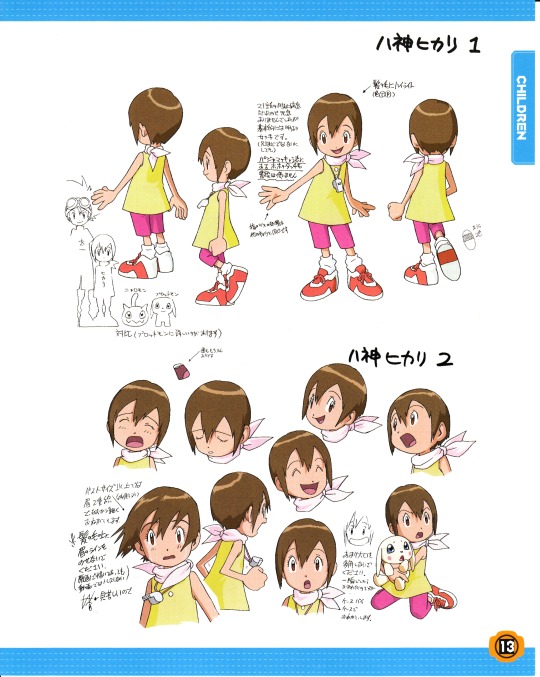
In fact, even model sheets based on her later appearances in Adventure explicitly instruct you in handwritten text to see her as a fairly bright and normal (if a bit reserved) girl, which does kind of contradict what Hosoda said here about mature ennui or whatever. Moreover, the notes directly say, in clear words to the point of using the episode number, that her behavior in Adventure episode 21 is to be considered as unusual for her based on the context of her having been sick from a cold at the time. Even notes aside, Hosoda’s movies and Adventure episode 21 are specifically the ones that treat her with that ~ingenue~ while the rest of the series itself does not. And, in the end, in terms of what actually made it into the series, it’s not like Hosoda said that Hikari explicitly has the hots for her brother or something (at least, those aspects are him obviously morbidly joking about it, so they do need to be seen as tongue-in-cheek humor) and more that he confirmed that he wanted to evoke that “atmosphere”, an atmosphere that completely vanishes in Hikari’s later appearances with Taichi. My suspected reason is that Hikari’s character wasn’t intended to be fully fleshed out at the time of her first appearance in Adventure episode 21 because she hadn’t been planned to join the Adventure group at the time (I’m guessing the Digivice tease at the end was just saying “Hikari won’t always be left out, don’t worry” rather than being intended to foreshadow her later outright joining the group), so by the time they got around to wanting to flesh out Hikari’s character as a regular, they went ahead and took a different direction with her. (But that’s just my guess, and is totally in tinfoil hat territory.)
So yeah, it’s not that I think Hosoda (and possibly Konaka’s) interpretations are invalid just because they’re guest staff, but rather that between them and the more than 50 other episodes Hikari appeared in, I’d rather prioritize the consistent portrayal across said episodes where she was shown to be a rather independent person, and take the parts from Adventure episode 21 and 02 episode 13 that actually track with that. Plus, if you can forgive me salting a bit, I do have some degree of irritation at the fact that two of Hikari’s most famous episodes, including her important introductory one, are put on such a pedestal just for being by “auteurs” -- I mean, 02 episode 31 is also important for her, but nobody ever talks about that despite that being one of her key moments of character development! -- and moreover I have to admit that I’ve historically had serious issues with both of their ways of handling female characters as well, which only drives my irritation towards it further. I fully admit that my refusal to have Hikari be seen in this light is partially because I don’t want her to be seen in this light either, but you have to understand that I’m going to have a prejudice against putting too much stock of Hikari’s characterization in the hands of the guy who wrote a whole thing about how feminists are the real problem and the guy whom I still hold misgivings against for portraying Sora in a disrespectful light in Our War Game! (which I also think has somewhat impacted fanbase discourse of her as a character rather than how she was actually portrayed in Adventure)...
Anyway, thank you for sitting through all that if you did! And thank you for the kind words; a lot of it comes from issues with things I’ve had to see, but I also was surprised at how many of the relevant misreadings I myself had made prior to recent rewatches, and the Chikara-Hiroki-Yukio thing was one of the reasons I was inspired to make it...
28 notes
·
View notes
Text
The different aspects of Miyako’s personality and character arc
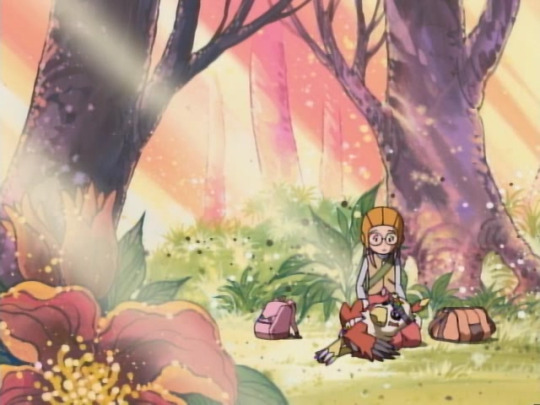
Miyako is a character where there’s just a lot going on with her in general, and asking different people to summarize Miyako in one phrase could feasibly get you some very different answers -- “the computer nerd girl”, or “the one who keeps talking about boys”, or “the one who panics all of the time”, or whatnot. Given that there’s so much to unpack at once even from her base profile, ironing out the full extent of her character arc can get a bit tricky, and there’s a lot going on with it. So, given that: Who is Miyako, anyway?
Miyako’s background and personality
Miyako is a character that I think is best understood by understanding what kind of person she is, and the personality and mentality she goes into the story of 02 with.
An interesting background story behind Miyako’s creation is that she’s based off a real person -- more accurately, a certain assistant producer on the series (whose identity has remained undisclosed, presumably for privacy reasons) was used as a reference for her behavior and actions. Although Adventure and 02 have a philosophy of portraying realistic human behavior in general, this level of specificity is a unique designation to have, and series director Kakudou Hiroyuki has referred to this a few times over the years -- it seems she’s the only of the Tokyo Chosen Children to have such a concrete single-person reference, and it’s also the reason her blood type of AB and star sign Gemini were given in 02 episode 25 (the other kids don’t have mentioned birthdays or blood types to prevent personality restrictions via horoscoping, but a real person having Miyako’s personality, star sign, and blood type wouldn’t make that as much of an issue). Even Volcano Ota himself confirmed Miyako’s resemblance to her upon hearing it after the fact! Indeed, a lot of 02 fans (especially adults) have admitted that Miyako’s probably one of the most relatable people in the cast, namely because her gushing about things she likes and panicking at things that overwhelm her is...well, a bit too uncomfortably on-point at times.
(And especially since so much about Miyako’s character has to do with how happy she makes everyone around her, it’s not too hard to imagine that the staff was so fond of her real-life inspiration that they wanted to pay tribute to her in such a way...)

Still, Miyako is a fictional character, one with her own backstory and interactions in 02′s story, and said backstory is such: she comes from a family that runs a convenience store in Odaiba, and is the youngest of a family of four siblings. Running a convenience store on a small island means that Miyako has probably seen a lot of the island’s residents, and her family also has various levels of connections to the other kids’ families (her older sisters Momoe and Chizuru are friends of Daisuke’s sister Jun, and Chizuru is Yamato’s classmate). Moreover, she’s befriended her nine-year-old neighbor (one who otherwise has trouble socializing with his peers) to the point of regularly going over to do computer repairs for his family. She’s also worked in the computer club under Koushirou, and even before the series has started, she looks up to him and adores him in a way not entirely unlike how Daisuke looks up to Taichi -- and although it’s unclear whether or not she started after the beginning of 02, 02 episode 29 reveals that she helps Yamato with his band.
The pattern here is that Miyako is extremely sociable, and one who actively pokes her nose into nearly everything so she can help out. This makes her a very different sort of Mom Friend from Sora -- both of them are Crest of Love holders for good reason, but in Sora’s case, she was compulsively going out of her way to help other people to the point of exhaustion, and her character arc was about trying to find a way to detach herself from obligations and do something for herself. Miyako is the complete opposite -- she’s the kind of extrovert who actively enjoys poking her head into other people’s business, picking up a bunch of peripheral hobbies so she can do something useful for everyone and go I’M HELPING!! If you actually look closely at those hobbies of “computer programming and hacking”, “hardware tinkering”, and “sound engineering”, other than vaguely being related to computers, they are completely different skillsets, and every single one of them is one Miyako’s depicted employing in order to help someone else out. (Koushirou is never really depicted as having super amazingly high technical skill and most of his unique talent comes from being a thorough analyst, but in contrast, while Miyako is established as being good at even hacking in Diablomon Strikes Back, she doesn’t really seem to have a huge propensity for deep analytical thought.) It’s hard to tell if she has any personal preference for any of them as much as she basically turned herself into a jack-of-all-trades so she could do whatever job was necessary for someone else.
If we’re to believe the official 02 site, Miyako’s been a bit pampered by her family -- as the youngest of four siblings, she’s the “baby of the family”, who hasn’t had to live with a ton of responsibility for others. This means that, much like Mimi, she seems to have been raised surrounded by a ton of affection, which is why she herself is such an openly affectionate person who’s open-minded towards trying all sorts of things, and why she’s used to wanting to help others by actively throwing herself into situations -- but it also means that, being the youngest of a family who is now in the situation of being the oldest in a new group, she ends up in Jou’s situation of suddenly being faced with the pressure of the concept of proper responsibility for others.
As far as Miyako’s general personality goes, she is constantly overflowing with affection and cheer and a desire to dote on everyone -- but the flip side is that she’s also aggressive. She has zero sense of restraint. (If you ever get around to listening to the Japanese version of 02, Natsuki Rio’s performance is energetic and over-the-top in almost every way imaginable to the point that you get the impression of Miyako as someone who doesn’t easily run out of batteries -- at least, until things start getting really serious.) When she loves something, she’ll gush about it as if there were hearts floating around her (and, depending on the level of closeness, even jump in and physically hug them), and she has no qualms against physically manhandling if she feels she needs to, and if she dislikes something, she will make it very clear (including yelling very loudly about it). You could argue that she’s actually closer to the archetype of the brash shounen protagonist than Daisuke himself is!
In fact, Miyako and Daisuke have very similar temperaments -- pure-hearted, but also rough around the edges -- but can be distinguished by the fact that while Daisuke is actually deferential and somewhat lacking in assertion, Miyako is actually aggressive, and while Daisuke’s “honesty about his feelings” is mainly because he’s too simple-minded to be any good at hiding anything, Miyako’s honesty is because she has no brain-to-mouth filter, and everything she’s thinking comes out of her mouth before she can control it -- in other words, Miyako has a huge case of foot-in-mouth syndrome. She doesn’t want to be insensitive, but it keeps coming out of her mouth before she can control it -- and even worse, her emotions are prone to taking control of her, and she is very prone to getting overwhelmed and collapsing into a massive panic.
If you think about the two archetypes of “girl who takes care of everyone” and “aggressive action girl”, Miyako has a tendency towards both at once, and moreover there’s an extra nail in it -- most “action girls” in the latter category would be portrayed as badass, put-together characters with a cool personality, but Miyako is a mess. She’s prone to panicking, all over the place, and her tendency to get in-your-face is not exactly in the most dignified manner. And as a result, a huge part of her character arc (as we will be going more into detail about below) is that she’s aware of this and doesn’t like this about herself -- because she doesn’t want to be insensitive or rude, and in fact she wants to be someone who can better help and take care of others, but, in her mind, her own personality keeps getting in the way.
Miyako in 02


After fully becoming a Chosen Child in 02 episode 2, it only takes one more episode for Miyako to bring food for everyone, as if to say “Right! I’m going to be working with everyone now! All of you are now my new best friends!” (”Bringing food for people” is one of Miyako’s many ways of showing love, given that she returns from Kyoto in 02 episode 34 and immediately hands off souvenir yatsuhashi to Koushirou.) And with that, Miyako settles into the archetype of the group’s “mood maker” -- someone whose role is to keep everyone in emotionally high spirits by influencing everyone with cheer and energy. 02 episode 5 features the debut of her famous “Digital Gate, open! Chosen Children, let’s roll!” catchphrase -- this and her other famous “Bingo!” catchphrase establish her as the only of the Tokyo Chosen Children to have a catchphrase (at least, in the Japanese version). Because catchphrases are fun.
As much as everyone (especially Daisuke) is a bit blindsided by her behavior at first, they eventually come to embrace the positive effect she has on all of them -- Daisuke very genuinely asks her for “the usual cheer” in 02 episode 10, and, all the way in 02 episode 22, this is such an agreed-on and established role that they’ll still wait on her to do the honors even when they’re in a hurry. So in other words, it didn’t take long for Miyako to go out of her way to shower everyone with cheer, and it didn’t take long for everyone to answer to that cheer and appreciate her for it.

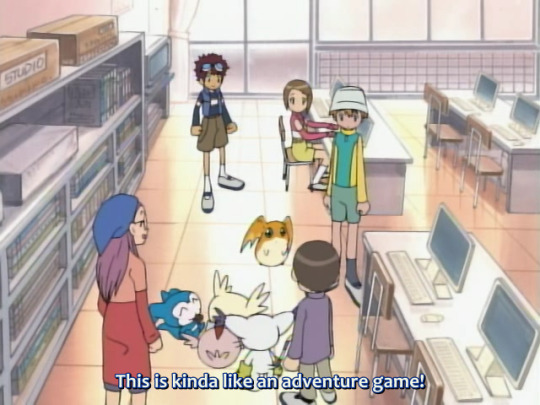
The flip side of this, however, is that Miyako doesn’t start off being very emotionally equipped to handle this -- right off the bat in 02 episode 2, she says that she’s not inclined for fighting, and in 02 episode 4, she refers to it as being “like an adventure game”. That is to say, she’s not at the point where she’s able to handle the full gravity of what she’s just involved herself with (Daisuke reminds her that she’d panicked earlier, but she just blows it off). She’s handling it so cheerfully now because the series is still in its early stages, when she can enter and exit the Digital World at will, and she’s capable of treating it like this.
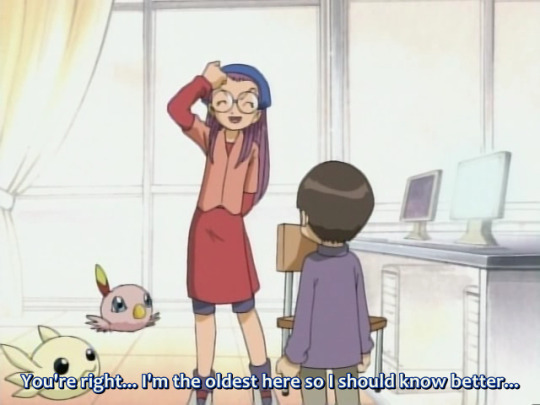
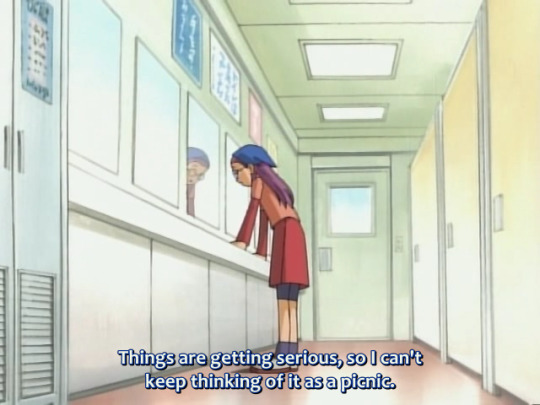
So when the stakes do get higher, she’s the first one to take the stress hard. As mentioned before, she’s the youngest in her family, now recast as the oldest in this group -- but unlike Jou, who consciously knew this fact and took stress onto himself because of the responsibility this entailed, Miyako seems to repeatedly forget that she’s the oldest in this group, and the events of 02 episodes 9-10 (when Agumon is kidnapped) cause her to break down from stress and have to take a time-out. (Which everyone allows her to do, because this is not a series where people are pressured to fight if they’re not emotionally ready for it.) Miyako comes to terms with the fact that the stakes are going to keep escalating, and she can’t just gloss over everything with cheer -- and she does manage to pull herself enough to bring Yamato into the fray at the end of the episode, but this continues to be a recurring theme for the rest of her character arc.
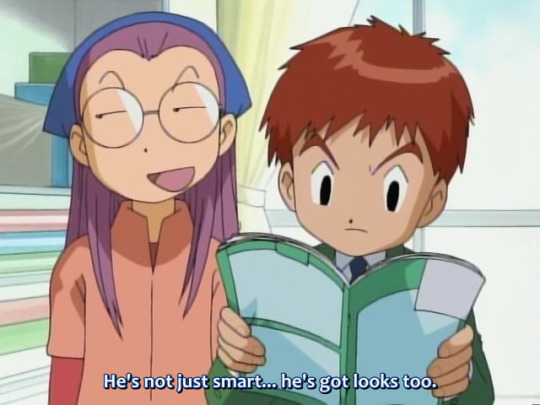
While we’re discussing these early parts of the series, one thing I want to briefly address is the part where Miyako infamously calls a lot of people hot. (Although, not as many as the fanbase would love to make you think; it’s only four people in total.) This tends to get her pinned as some kind of flirt whose head is only filled with being hot for people, but while she’s certainly a bit on the shallow end at this point of the series -- dealing with that being what this character arc is about, after all -- this trait of hers tends to get exaggerated by a lot of people in the audience as if she’s completely lacking in common sense. Miyako’s ridiculous (and we love her for it), but she does have some degree of grip on herself! Context is important here -- she might show a crush on someone, but at no point in the series itself does Miyako show any indication of seriously thinking of full-on dating.
For Miyako, who’s accustomed to just blurting out the first thing that comes to mind, commenting on someone being hot is like commenting on the weather -- she means it as a compliment, but there’s no evidence she thinks she has a chance with any of them, let alone wanting to try dating. This is especially when you take into account her self-esteem issues that we learn about later in the series, and also...well, the fact she’s only twelve. (Remember: even Daisuke’s thing for Hikari comes out as a lot of unfocused affection, and it’s unlikely he’s seriously considered the concept of following that up with a serious relationship -- any serious prospects of romance or dating are not going to be on the table for these kids for a while.) Miyako has also been accused by some of being abysmally shallow for still complimenting Ken’s looks in 02 episode 9 (after it’s already apparent he’s the Kaiser), but although she certainly is a bit shallow at this point of the series, she’s not that lacking in common sense; Iori got in on it too in this scene, and both of them were doing it to tease Daisuke more than they seriously wanted to compliment the Kaiser all that much. So in essence, it’s just “Miyako has eyes” -- she still completely agrees he’s their enemy and she’s not going to judge him any better for his looks, but she also doesn’t see this as a reason to lie about the fact she thinks he’s visually good-looking, especially if it’s to tease Daisuke about it.
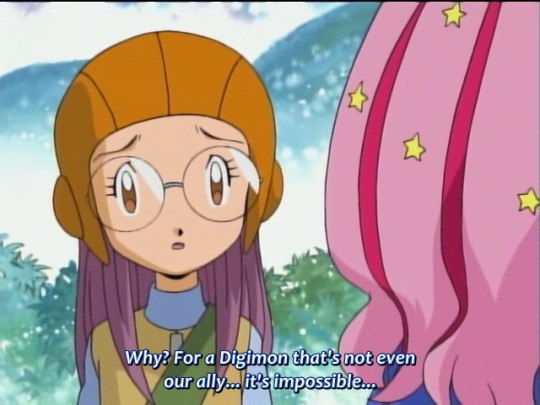
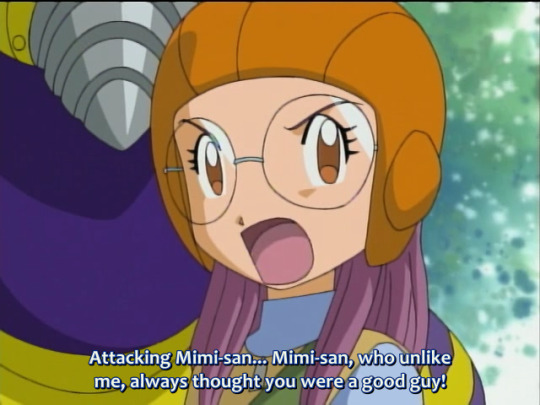


In any case, 02 episode 14 digs a lot more into Miyako’s stance on herself regarding others -- in 02 episode 6, Miyako met Mimi for the first time, and latched onto her for their similar dispositions and her looking up to Mimi for being beautiful, amazing, and cool (and she should, because she’s right). 02 episode 14 adds another layer to this, however, when Miyako spends the duration negatively comparing herself to Mimi. At first it starts off as simply just shallow jealousy for Michael giving Mimi more attention, but as the situation with Digitamamon escalates, Miyako spends a prolonged period of time trying to figure out Mimi’s behavior of pure-heartedly choosing to trust Digitamamon despite everything, against Miyako’s insistence that Digitamamon’s behavior proves that he was untrustworthy the whole time.
Mimi and Miyako’s stances are both on extremes here -- Mimi’s pacifistic tendencies are causing her to let her get beaten up by Digitamamon despite the fact that “appealing to people’s hearts” has never really been demonstrated as a good way to get Evil Rings off (to be fair, this is probably the first time they’ve made an attempt at this with a Digimon that can still talk coherently with it on), but Miyako’s acting as if this retroactively proves him to be untrustworthy even though she knows that the Evil Rings are tantamount to brainwashing. Nevertheless, Miyako acknowledges that her own stance was borne out of her being shallow and judgmental, especially since the discussion between Mimi and Digitamamon brings out a question about the meaning of the “true self”.
Miyako, at this point, is confronting everything that’s bad about herself -- that she’s shallow and not as much of a “good person” as Mimi is. But the Crest of Purity -- once meaning “lack of malice” back when it applied to Mimi in Adventure -- now has a secondary meaning of “not lying to oneself” (the dub translation of “Sincerity” is not actually that off in this sense), and it also means that Miyako is not going to get anywhere pretending or forcing herself to be someone she’s not. The secondary Digimental arc has a recurring theme of understanding that there are still things you need to learn and improve on in order to do better, and this is Miyako’s version of it -- she will have to acknowledge all of the bad parts of herself before she can get anywhere and become a kind person like Mimi is -- and, indeed, becoming less shallow and judgmental and not jumping to conclusions, and learning to reach out to more substantial cores of the problem, ends up becoming a major part of her character arc in the latter half of the series.
This episode also implies one more thing, even if she doesn’t realize it yet at this moment: the path to her becoming a less shallow and more considerate person is not going to involve trying to force herself to be like Mimi, but rather in a way that’s closer to her “true self”.

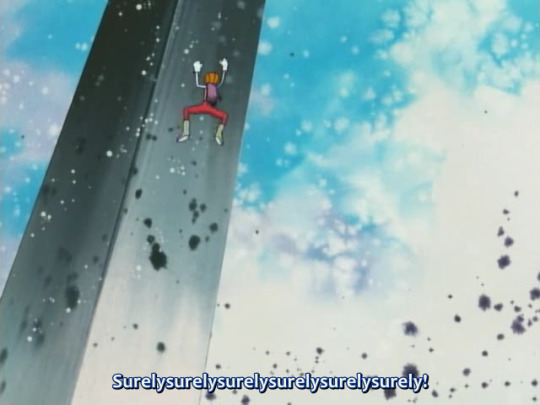
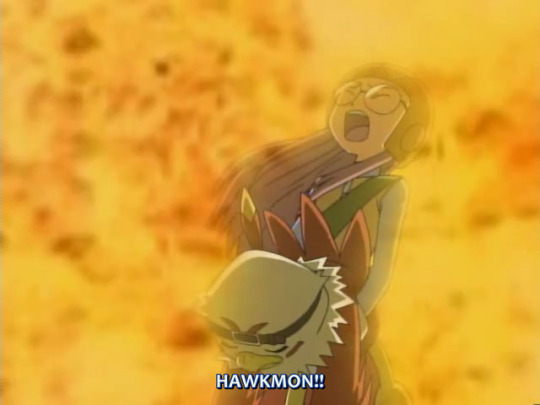
Miyako’s first major turning point is in 02 episode 18, an episode that’s said to have such a profound impact on her that even Natsuki Rio testified to having to alter her Miyako performance thereafter.
Back in 02 episode 10, Miyako first started to realize that this whole experience of fighting as a Chosen Child was a lot more stressful than it seemed at first, and reacted badly to it. Here, the ante gets upped even more -- the kids decide to make use of their summer break and organize a Digital World stakeout, and, eventually, Hikari accidentally becomes indirectly responsible for tipping Miyako over the deep end by making an implication that they need more “determination” to the point of refusing to leave until they’ve beaten the Kaiser. (Remember that Hikari can be terrifyingly assertive as long as it’s not something to do with herself.) For Miyako, who’s never had the same experience of being in the Digital World for a prolonged period of time the same way the Adventure group has, this is terrifying, and she tries to “get herself together” over the night -- only to completely overshoot it and go into the complete other extreme. As much as this ends up being one of Miyako’s peak hilarity moments, it’s most certainly representative of her being under a huge amount of pressure and stress, and it’s effectively her “peak worst” moment -- which results in Hawkmon ending up having to cover for her, and getting injured in the process, and Miyako immediately realizing how badly she’d messed up.
Miyako is thus forced to face a major consequence of her behavior: if she doesn’t manage to figure out a way to get herself under control, other people will be hurt, and as someone who wants to do her best for other people, that’s one of the worst possible outcomes for her.


In addition, it’s also important to point out Hikari’s role in this. The Jogress arcs have yet to set in, but the series still gives you a little preview of what’s to come eventually, such as the insight we get about Daisuke and Ken’s initial attitudes towards each other in 02 episode 8, and Iori later personally witnessing (and being very disturbed by) Takeru losing his composure in 02 episode 19. In this case, we see a bit of what Miyako and Hikari’s opposing personalities can offer for each other (especially since the later 02 episode 31 more heavily involves Miyako returning the favor in the other direction) -- Hikari correctly identifies exactly what it was that set Miyako off, takes responsibility for it, and even decides to make sure Miyako and Hawkmon get proper alone time so that they can figure things out. In general, everyone in the 02 team is understanding of Miyako’s antics and doesn’t hold any of it against her because she’s doing her best, but right now, Hikari may be the only person in this group who can actually proactively do something about it, because Daisuke’s not assertive enough to step in, Takeru has a tendency to dodge things whenever they get awkward, and Iori’s holding himself back too much for the sake of manners (especially in the presence of Miyako, who’s the oldest one in this group). But while Hikari does have an emotional repression problem, she’s perfectly capable of holding herself together and putting her foot down when it comes to other people, and because of this, she’s the one who’s able to understand what exactly is going on with Miyako, and how to adjust the situation around her to make things easier for her.

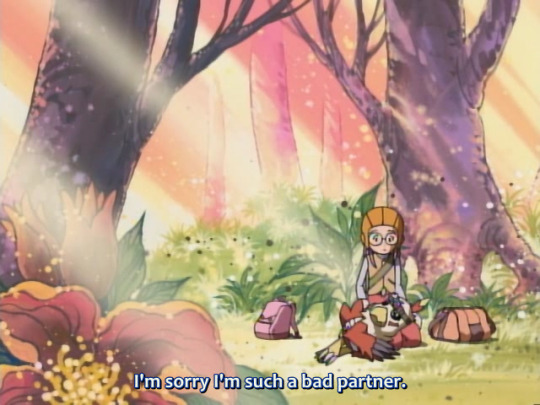

Miyako and Hawkmon have a proper heart-to-heart, and we see more of Miyako’s self-hating tendencies going on here -- she refers exactly to her problems with impulse control, and even labels herself a “bad partner” as a result. But Hawkmon reassures her that she’s fine the way she is, and it ties into how a larger theme of her character arc will involve her learning to find better ways to channel the qualities she already has, rather than trying to force herself to be someone she’s not.
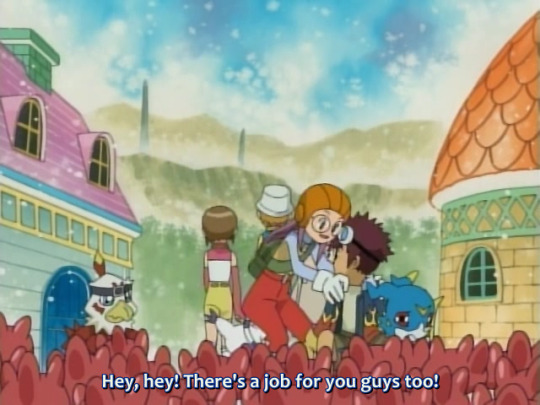
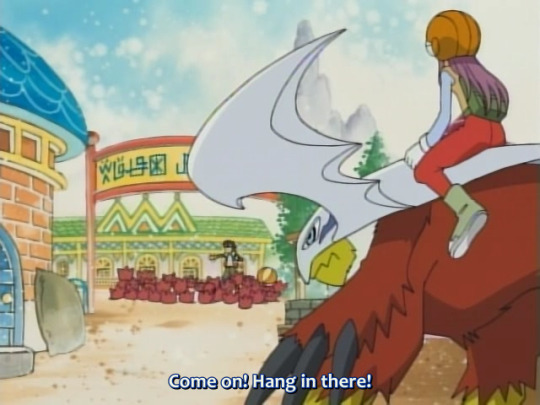

Once the Kaiser is defeated, the second half of the series is where we start to see Miyako’s growth start to really kick in. In 02 episode 24, there’s a short blink-and-you’ll-miss-it scene where Miyako suddenly takes Daisuke and puts him in charge of taking care of the Punimon. Why is this important? Because two episodes prior, Daisuke had been running around in circles like an idiot due to having been third wheeled by Takeru and Hikari, and the moment Daisuke started exhibiting similar signs this time, Miyako personally stepped in and gave him a job to do -- and her actions of keeping an eye on them and her conversation with Takeru and Hikari indicate that she did it exactly because she figured that he would like it. Or, in other words, Miyako correctly identified Daisuke’s need for validation and purpose, and became the first person to proactively do something to address it -- Hikari and Takeru had generally been dodging it awkwardly for the duration of the series, which had only really been making it worse, and, in the absence of another crisis to take care of or someone like Ken to fill the void in Daisuke’s life, Miyako was able to properly figure out exactly what he needed at the moment as a stopgap, and thus is starting to settle into her proper role of understanding what others need in terms of emotional support and actively working to address it.
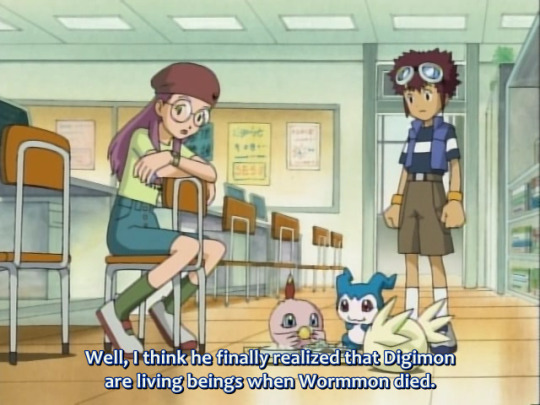
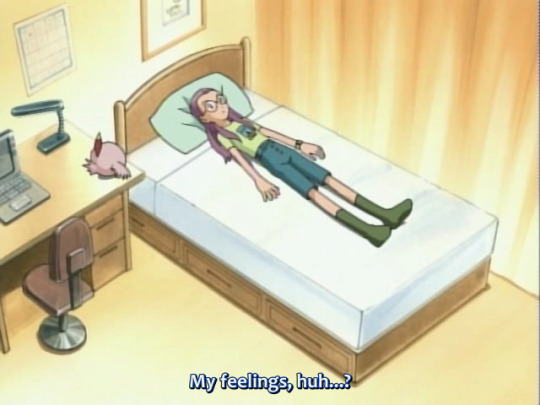
Since the second half of 02 is dedicated to Ken slowly establishing his place in the group, 02 episode 25 is dedicated to Miyako tussling with her conflicted feelings on the situation -- she’s just as open-minded and pure-hearted as Daisuke is, but the one thing that’s bothering her is that she’s a little more doubtful than he is in regards to whether Ken’s heart is really in the right place with all of this. She says, outright, that she believes he’s learned his lesson -- in a way far more firm than Takeru, Hikari, and Iori are about it -- but that one thing about him having potentially killed Thunderballmon in cold blood doesn’t fit the optimistic image she’d like to have of him.
Daisuke is more practical-minded than she is and is more willing to accept that there might have been a good reason -- especially since he himself starts to consider in this very episode that killing an enemy may be necessary if it’s the only way to prevent more victims -- but Miyako is more emotionally oriented and just can’t accept the idea of doing this at all. Both the internal debate over accepting Ken and the internal debate over having to potentially do a kill tear her apart over the course of this episode, and Miyako finds herself constantly waffling back and forth between the two positions. It’s not just her expressing minor doubt; she actually agonizes over this for the duration of the night and the next day, to the point she even considers asking him about it (and eventually can’t bring herself to).
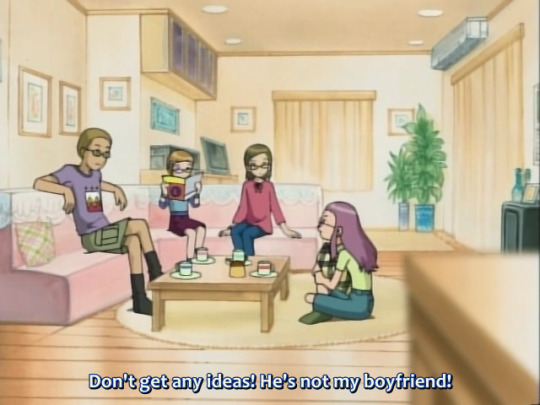
It’s also made a prominent point that Miyako’s prior attraction to Ken in 02 episode 8 was not the reason she wanted to be optimistic about him -- remember, back in 02 episode 14, she completely admitted that she judges people by appearances, but at this point she’s well past that! Miyako takes this entire issue of whether Ken should be considered a friend very seriously, and that’s why it torments her so much over the course of the episode.
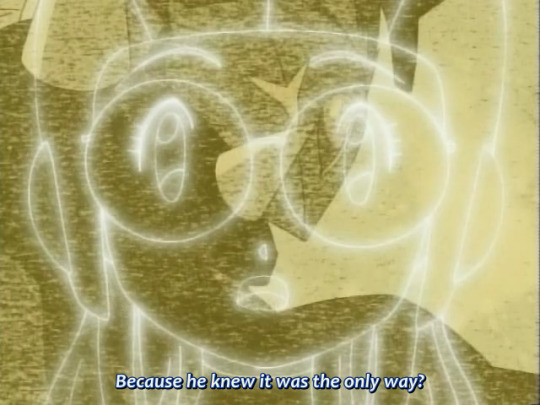

Eventually, all is resolved (at least, for the time being) when it turns out that Ken has been dealing with non-sentient Dark Tower Digimon, and Miyako takes this as sufficient evidence that Ken has changed -- the morality debate about killing comes back in full force in 02 episode 43, and Ken himself ends up just as shaken about it, so the important part is that she understands that he’s trustworthy and wants to put faith in him. Attention is also given to Miyako deciding she’ll now call him by given name (”Ken-kun”) from now on -- even Daisuke himself won’t start calling him “Ken” regularly until 02 episode 39, but Miyako starts slowly inserting given-name basis for Ken into her vocabulary from this point on until she finally commits to it fully in 02 episode 30. This is a proactive and conscious act on Miyako’s part that she actively wants to get to know him better and consider him a close friend, and it’s because of this that she ends up one of the only people who never gets habituated into surname basis with him by the time everyone’s come to properly befriend him.
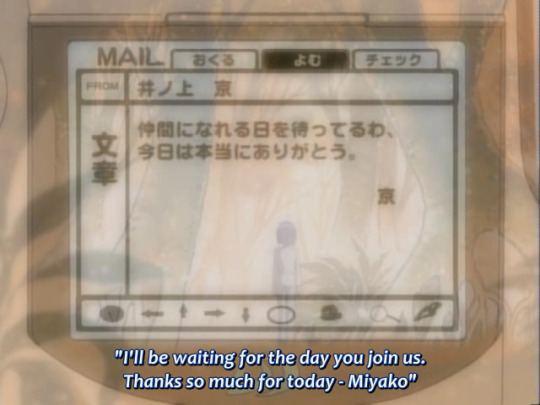
So, at this point: Within only one episode (and, in-universe, one day), Daisuke and Miyako landed on the same page with their ideological stance towards Ken. They’re both open-minded and forward-thinking, and have an interest in becoming his friend (the next person to show active and open goodwill towards him, Hikari, won’t do so for another 9 episodes). However, despite their surface temperaments being somewhat similar, they have some differences in their priorities and way of approaching things, and it means that each of them ends up reaching out to Ken in ways that the other isn’t as good at. Daisuke, being the very practical and simple-minded sort who doesn’t overthink things or get caught in arbitrary philosophy, is the one who most proactively reaches out to Ken and most famously connects with him the most due to Ken very badly needing guidance in how to move on forward and stop getting fixated on his past. Miyako, on the other hand, being very much the type to consciously think about things (to the point of sometimes thinking about too many things at once) and focus on “how do I most show my support for someone right now?”, puts her priorities on checking on Ken’s current emotional state and actively attempting to glean his feelings and position. 02 being a series about relationships and what people can provide for each other, this ends up reflecting on their roles in the group as a whole -- Daisuke becomes the person who can pull everyone forward in determining the best thing to do, whereas Miyako fills in the parts his rough-around-the-edges demeanor doesn’t quite cover in terms of supporting everyone emotionally and keeping them together.
And thus, Miyako resolves to “wait” until the day Ken will join them -- that is to say, she takes the stance that Ken deserves proper space and to come on his own terms. It’s an interesting inversion of the usual roles you’d expect from Daisuke and Miyako at this point -- and, again, since 02 is about relationships, “each character’s approach towards the new kid and how it impacts them” reflects a lot about their own characters. For Daisuke and Miyako, who were open-minded towards Ken early in the game, you can already see the impact on them -- the necessity of reaching out to Ken causes the normally deferential Daisuke to become more proactive and put his foot down, whereas the normally uncontrollably in-your-face Miyako comes to understand when something needs to be handled delicately and starts getting a better grasp on the concept of restraint.



Which means that Miyako’s actions regarding Ken in the following episodes are significantly more passive than Daisuke’s are, but it’s clear that she’s still supportive. Moreover, it’s also important to establish that she and Daisuke aren’t fighting about this or anything -- Miyako does want Ken to come around eventually, so she doesn’t stop the more proactive Daisuke from reaching out to Ken in an important way, but she instead exerts her position in ways such as joining in with the others reminding him that Ken might have gotten a bit emotionally overwhelmed by the Jogress (and thus that it’s understandable that he might need some time to parse this before pushing the issue further). The way Miyako words this statement so casually can easily be a distraction from the fact that she is completely correct -- as we see later, Ken did emotionally freak out the moment the incident was resolved and had to go home to think about this. Scatterbrained as Miyako may seem, as the series proceeds, it turns out that she has a natural propensity for empathy that means she’s capable of making perfectly correct readings of the situation, even without her thinking that hard about it.


Not that she’s correct all of the time, though. 02 episode 30 has her attempt to get Ken and Iori to hopefully be a little less tense around each other end in complete disaster (although to be fair to her, it’s not like she and Daisuke were particularly forceful about it, it’s just that their plan was so poorly set up that it was too easy to read the motive behind, and it’s ultimately thrown off because -- as Daisuke correctly points out -- the two are being really childish about it.) But in response, Miyako takes direct action and responsibility to fix the situation when Ken continues to refuse to help despite how badly the situation is escalating, and when she finally reaches him, she gets frustrated at the fact he’s being so stubborn, smacks him, and personally drags him back over. Miyako cared a lot about this, she had wanted Ken and Iori to get along for no reason of personal benefit to herself but more because she cared that much about the group’s dynamic and friendship, and she’d held herself back so much because she was worried about him, but here he’s taking all of that and still giving them all the cold shoulder when everyone is in grave danger, and all of that frustration causes her to break down at once.
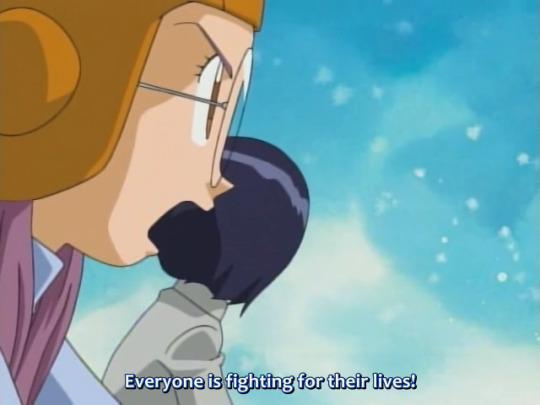
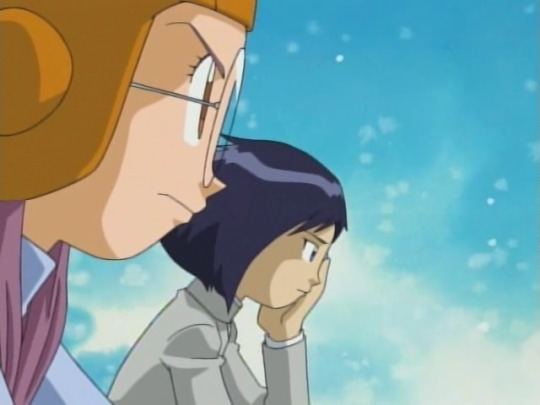
And note Ken’s reaction -- he’d been holding off on the grounds that he was being a burden on everyone’s friendship, but he sees Miyako distraught and upset and calling him an idiot (i.e. his whole pretense of not hurting others has clearly not worked here), and his “idiot...?” comes out flustered and off-guard, and he shows no resentment towards her thereafter and comes quietly with no protest, even holding a hand to the place she’d smacked him as if mulling in agreement that he deserved that. So, again: Even when Miyako is coming to all of these conclusions in a haphazard manner, it doesn’t change the fact that her readings of these situations are often completely correct.
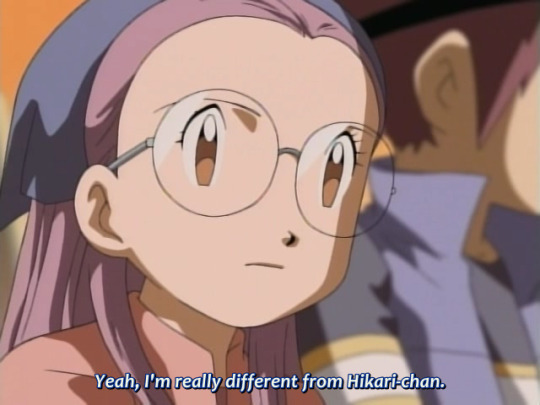
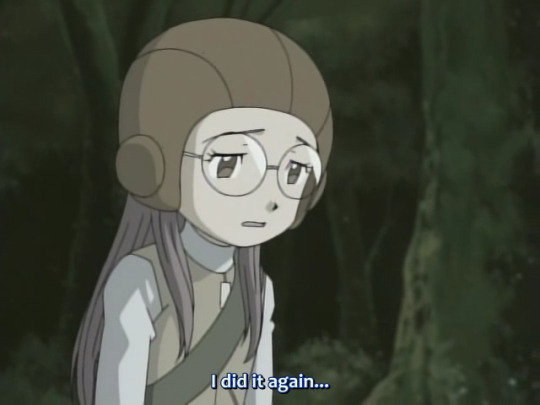
02 episode 31 is another landmark episode in which we get a lot of insight into Miyako’s current feelings regarding herself in comparison to others, and what she’s trying to achieve at this point in the series. Daisuke makes an offhand remark at the beginning of the episode about Hikari being more “kind” than Miyako (”kind” having a double meaning of “gentle” in Japanese, so Daisuke’s mainly referring to Miyako being such a rough and belligerent person). The way Miyako takes this statement indicates that Daisuke had accidentally just hit a very deep-seated complex within her -- Miyako had never liked the fact she was aggressive and belligerent and in-your-face (remember, back in 02 episode 14, she was constantly negatively comparing herself to Mimi for not being as good of a person as her, and now this has extended to Hikari, who “keeps so much inside”.). As the crisis in the episode escalates, Miyako continues to fall victim to her foot-in-mouth syndrome, saying things and instantly regretting it, because she sees herself as making the situation worse -- and especially when it comes to a situation also involving Ken, whom she’s actively trying to reach out to right now. Her frustration at the fact she can’t see what Ken and Hikari see is because, unable to understand what they’re talking about or what their feelings are, she’s basically a sitting duck who can’t do anything while things are getting worse for them.
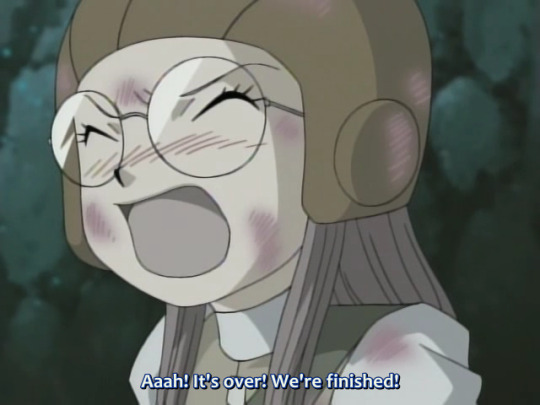

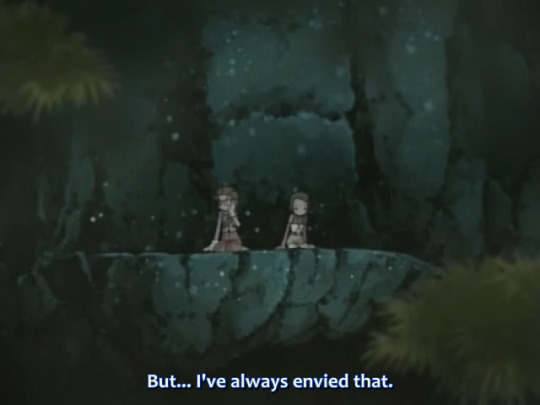

Which ultimately results in Miyako completely losing her marbles and Hikari having to smack her out of it -- again, recall that in 02 episode 18, it was shown that Hikari is one of the few people who has enough assertiveness to be able to rein in Miyako’s behavior, and even outright admits that Miyako is a bit of a handful. Miyako, as it seems, had been carrying a complex that Hikari had been thinking of her badly for all of this -- but Hikari then proceeds to reveal the flip side of all of this: she’s also conversely jealous of Miyako for being able to express herself so clearly and easily, because she herself is the type who compulsively represses her own feelings about herself, which is why nobody had been able to properly reach out to her for the duration of Adventure and 02.
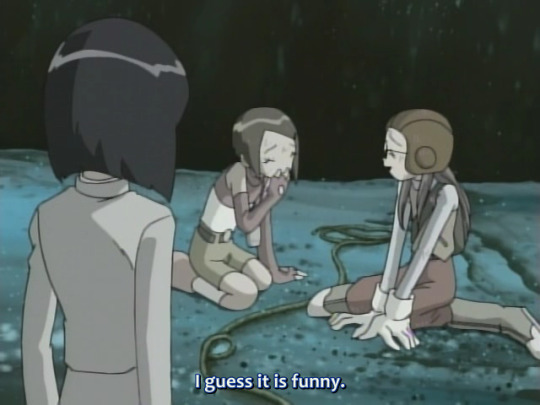
For someone who had spent so much time considering herself a “bad person” and a “worse person” in comparison to people like Mimi and Hikari, that someone considers her qualities outright enviable is a huge deal -- it’s not that Miyako’s an objectively worse person than all of the other people who aren’t as rough or in-your-face, but rather, that those qualities can bring out positive things in their own way. And, immediately after that, we see one of those things -- she makes Hikari laugh, thanks to her antics. Of course, it involves Miyako being a bit all over the place and making a lot of mistakes, but even she admits “I guess it is funny.”


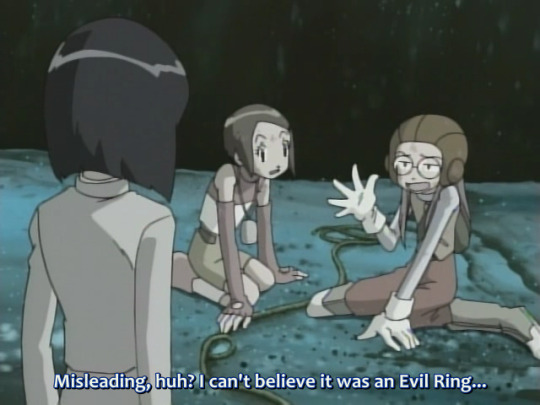

And there’s another thing to this, too: Miyako continues to end up with foot-in-mouth as she casually refers to things like the Evil Ring and Ken being the Kaiser with zero fanfare, before realizing seconds after that she probably shouldn’t be doing that in front of him, but, once again, even without her realizing, her evaluation is not incorrect -- although the fact he’s extremely out of it doesn’t make that clear quite yet in this episode, Ken is not the kind of person who’s touchy about acknowledging that he was the Kaiser, and, by his own statement in 02 episode 23, his stance is that he wants to “accept everything about it”, take responsibility, and move on. So here we are with Miyako, who just casually tossed that statement out like it was no big deal, has accepted his past with no lingering grudge against him, and even made a casual evaluation about him presumably having the same resilience he had as the Kaiser, which, again, is completely accurate. All of this is exactly the kind of attitude that Ken needs to be surrounded by right now, and Miyako had just touched on this without even thinking that hard about it, and also is still making it clear she doesn’t want him to feel bad about it...

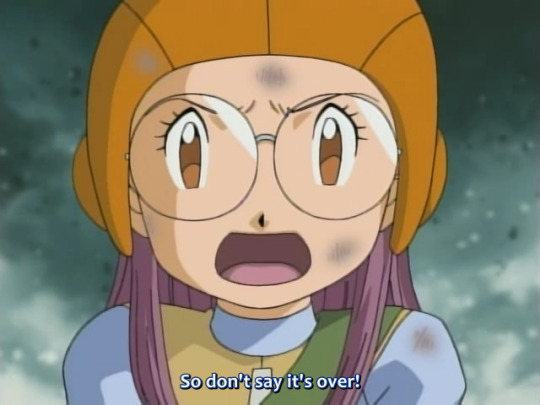
And so, the episode’s climax has Miyako finally attaining the solution to the question of reaching out to Hikari, the one that nobody had been able to successfully accomplish throughout Hikari’s childhood of never expressing herself properly and the majority of Adventure and 02: to get Hikari to stop being so passive and accepting her inevitable fate because she doesn’t want to burden others, someone as aggressive as her will need to reach her and yank her out, and hit all of the exact points about understanding that someone will be there for her and that she should not accept this defeatist mentality. Hikari is unusually, unhealthily passive, and Miyako, being outwardly aggressive and someone who never hesitates to be blunt about things, is the best person to yank her out of this; it was never a sign of her being a “bad person”, just something she needed to channel in the right direction.
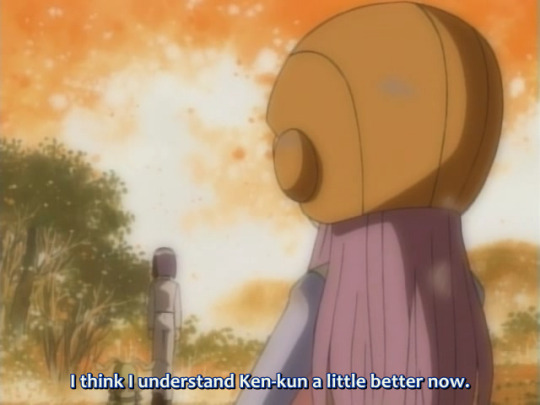
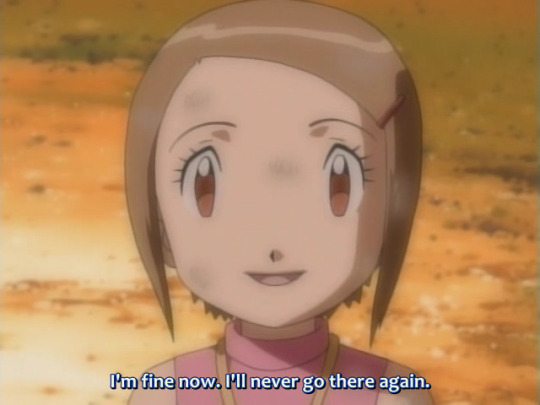
At the end of the episode, we’re also reminded once again that this is a series about relationships, so this kind of growth is important to everyone’s relationships with others as well -- thanks to Miyako’s efforts, Hikari is finally able to speak honestly with Takeru in contrast to her way of leaving off in silence with him at the end of 02 episode 13, and Miyako herself is happy that she’s finally gotten to have a better understanding of both Hikari, whom she herself had been unsure about the position of earlier, and Ken, whom she’d been worried she hadn’t been reaching out to in the right way.

While Ken was out of it during said episode and unable to coherently respond, we do get confirmation that he himself has hopped on the train of respecting Miyako’s intent well enough that he doesn’t hold anything over her -- during 02 episode 33, a mere three episodes after she’d personally slapped him in the face and two episodes after he’d practically seen her at her emotional worst, he still takes it upon himself to personally deliver Poromon to Kyoto and trust her to handle the rest. This isn’t that particularly interesting by itself, but moreso in terms of the context this is in -- this is a point where Ken’s still at awkward arm’s length with a lot of the team (including even Daisuke, in some ways), and he’s seen Miyako do all of the above messy things only not too long ago, but he still is comfortable enough around her and trusting enough in her abilities that he’s okay with casually approaching her and saying “you got this.” So it’s working, all things considered!
We also learn that Miyako had trusted Koushirou with Poromon during her trip to Kyoto, which says a lot about the fact she trusts her senior that much -- and, on a meta level, seems there specifically to facilitate the existence of the above scene (it would have been very easy to save time by just having Poromon accompany Miyako from the get-go and ending Ken’s involvement in the episode at his conversation with Koushirou...).
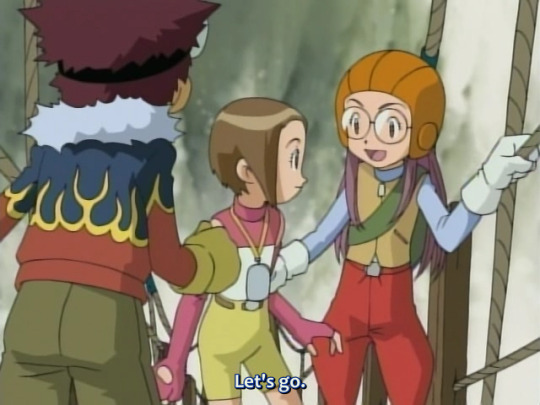

The following episodes also meanwhile establish that Miyako’s relationship with Hikari has been improving a lot -- with Miyako now actually understanding what Hikari needs, she’s much more proactive in reaching out to Hikari, and it’s even said directly by Iori in 02 episode 36 that their relationship seems to have gotten much better now. And, once again, Miyako’s antics are depicted as making people laugh -- note her and Hawkmon’s over-the-top advertisement performance doing so for everyone in the vicinity.
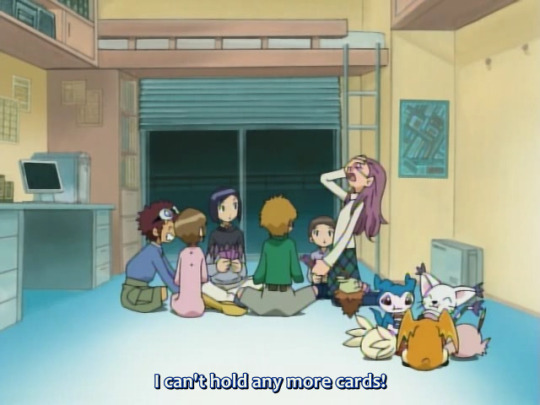

Which is also reinforced, again, in 02 episode 38, when this even spreads to Ken himself, in a moment that’s said to be particularly unusual and portrayed as one of the first times Ken has been able to be truly carefree in a long time. Again, the point here is: Miyako’s “all-over-the-place” nature brings joy to other people, and that “she makes people laugh” is continually reinforced as a symbol of this over the course of the second half of the series.
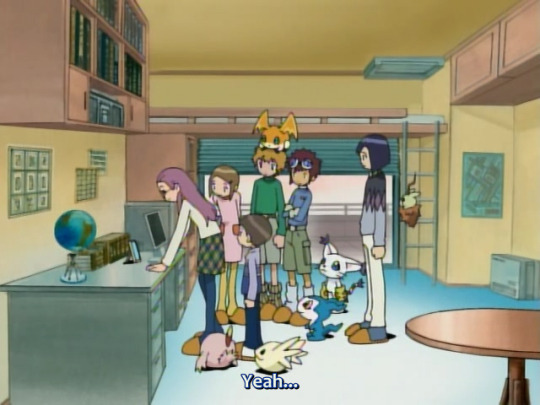
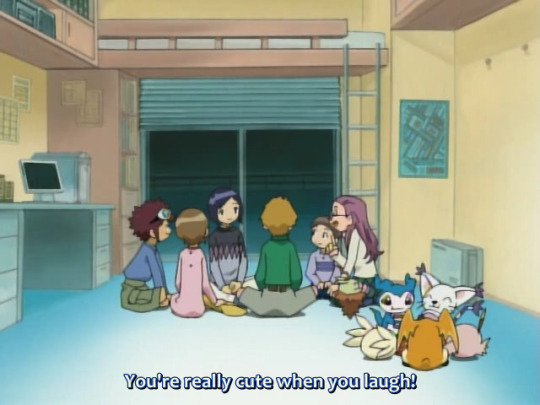
Beyond that, the visit to Ken’s house kicks off with Miyako noticing the picture of Osamu and asking about it, to the point she’s shown leaning over and staring at it for quite a while -- Koushirou had allegedly informed her about it earlier, and a whole point is made that she’s the one very prominently wanting to understand more about Ken and his background.
Also, Miyako reminds us all that she still does think Ken is attractive, but it’s a huge contrast to her behavior from back in 02 episode 8, when she knew nothing about him except that he was some celebrity genius boy -- she got completely worked up about it, moped about it for a whole day, and even dragged the fixation into the next day when she started aggressively confronting Daisuke about it, but we’re here 30 episodes later with Miyako actually considering him an important friend that she respects the feelings of, and she simply casually tosses out the statement of him being cute in her usual “like it’s commenting on the weather” manner, with no extra weirdness about it.



We close up some of the threads of Miyako's character arcs when Miyako herself is forced to confront the possibility of fighting an enemy to the kill in 02 episode 44, and Silphymon is eventually forced to kill LadyDevimon to save Miyako's life. Miyako’s emotional reaction is given the most attention here, since she herself had fixated so much on the horror of potentially killing Golemon back in 02 episode 25 -- in fact, everything Miyako does in this episode is about her emotional empathy and empathy for others, in that she rails on LadyDevimon for being a “coward” who hurts other people. Eventually, it’s once again the assertive Hikari who’s able to get her back on her feet by putting it in a way she can understand -- they were not doing it out of a callous and cruel intent to kill, but to save the exact victims that Miyako herself wanted to prevent.
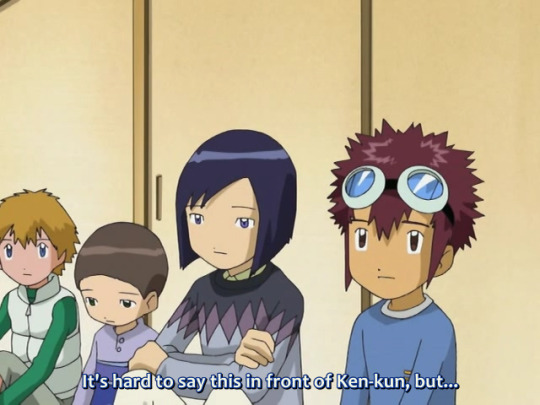
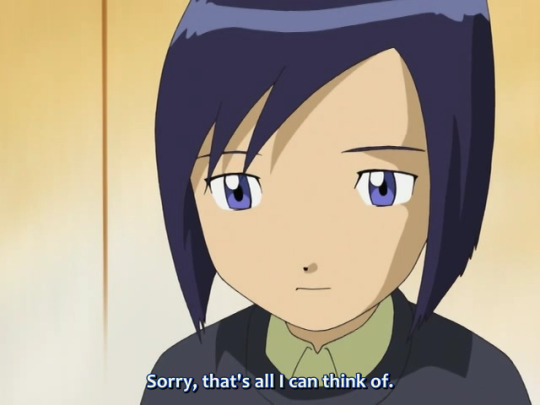
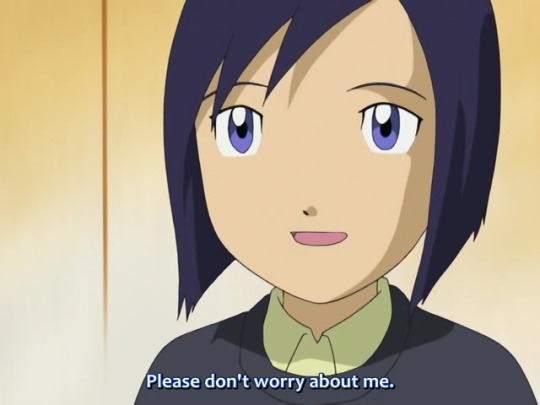
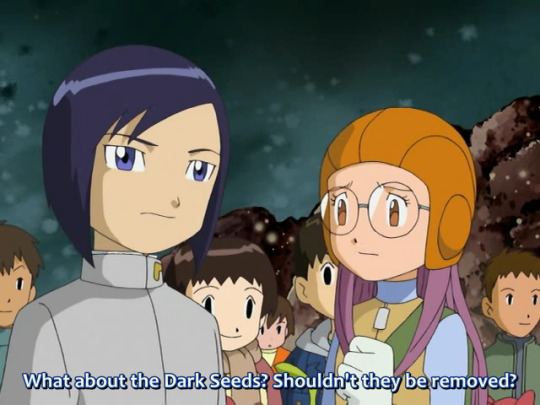
And, even to the very end of the series, Miyako continues to channel her proactivity into emotional awareness first and foremost -- 02 episode 46 has her take the lead in the Dark Seed roundtable, and it’s implied that she’s doing this mainly because she knows this is a very personal issue for Ken to have to witness. In contrast to the way she frantically started spitting out potentially insensitive things in front of Ken in 02 episode 31, here, she outright says that she doesn’t want to make him feel bad about this (and, fortunately, he understands perfectly well that she’s trying). Even all the way to the very end in 02 episode 50, she’s the one who first brings up the question of the issue, because of how emotionally invested she got into this and her high level of awareness as to how deeply this impacted Ken.



In 02 episode 49, BelialVamdemon presents everyone in the team with a potential deep-seated desire that none of them want to admit, and in the case of Miyako’s, it ends up being a rather tame thing in comparison to Iori and Takeru’s more severe family issues, Hikari’s desire for WORLD PEACE!!, and Ken’s complicated feelings about punishment and forgiveness. In Miyako’s dream world, she’s just eating cake, and it says a lot about the fact that were it not for the fact that she overthinks things and often gets easily stressed, she’s fundamentally fairly free of deep-seated issues in a way not entirely dissimilar to Daisuke’s simple and pure-hearted way of life.
The thing that causes Miyako’s issue is often misinterpreted to be about her selfishly wanting everything to herself, or the idea she’s fighting for attention with her siblings, but Hawkmon actually says what the real problem is in direct words: her crowded family is “noisy”. Or in other words -- Miyako, being the overly empathetic type and someone who easily succumbs to stress, is just really overwhelmed and stressed because of everything around her.
An interesting thing about Miyako’s “illusion” is that it’s the only one that in itself starts making its victim feel lonely and sad even before it’s taken away or dispelled -- Takeru and Iori had to have their happy images pulled away from them, Hikari had to have Tailmon clarify that everything is fake, and Ken had to have Wormmon personally chase the image of his brother away. But in the case of Miyako, all Hawkmon has to do is ask if she’s happy right now, and she’s quick to admit that she’s not. It’s just that everything was stressful and overwhelming and there was so much to deal with all of the time, and for once she wanted to be able to enjoy a little peace, but she loves her family and she loves everyone around her and she doesn’t want to be alone, and she’d rather have them back even if it’s stressful. Miyako’s love for others is so strong that even an illusion supposedly made to cater to her won’t make her happy if everyone’s gone.

Miyako also takes the moment to realize that for all Hawkmon’s been going out of his way to be steadfast and loyal to her, she hasn’t been doing enough to understand her own partner in turn, and there’s still a lot more she can do in terms of thinking of others.
Miyako after 02
As per Spring 2003, once Miyako graduates elementary school and moves to middle school, she continues trying to be helpful to her juniors -- she joins the computer club and once again ends up under Koushirou, and now outright makes music for Yamato’s band (some creative differences aside). It’s also interesting to note her attitude towards her other friends when she tries to recruit them into her music unit -- she snarks at everyone right up until she gets to Ken, who declines politely, and in exchange, she just can't bring herself to be mean to him and simply apologizes for asking too much. It’s ambiguous whether this is because she’s still trying to have a heightened level of consideration around him (this is still only four months after 02′s finish, after all), but it seems she’s still concerned about the idea of handling him overly roughly, and is able to exercise a proper level of restraint about him.
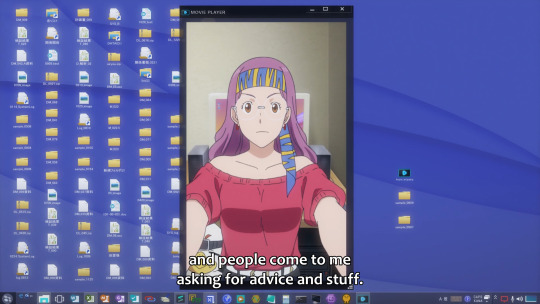
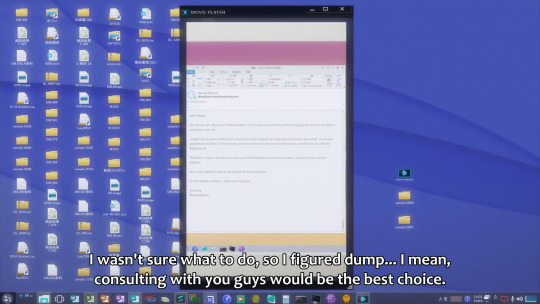
Which brings us all the way to Kizuna, a whole eight years later where we have to fill in a lot of blanks about what’s been happening in the meantime, but the official website establishes that she’s now pursuing a degree in computer programming at an engineering university, and is now on study abroad in Spain (implied to be Barcelona, given details in both the movie itself and the drama CD). Pretty ambitious stuff!...or at least that’s the first impression one would get, until it turns out that she’s getting her flighty personality enabled by the local culture. As we learn in the drama CD, she’s absolutely taking the time to milk this entire situation so she can play around -- and, in accordance with how she was established to be an important factor in bringing Hikari out of her shell, it’s rubbing off on Hikari, too.
In addition, Miyako is still working under Koushirou despite their educational careers having completely diverged, this time as his assistant in terms of managing the Chosen Child community. Interestingly, her specific job seems to be consultation, and people come to her for “advice and stuff” -- meaning that it’s very likely that a lot of new Chosen Children who are having a hard time adjusting to life with a partner are coming to her for practical and emotional advice, and she’s still continuing to channel her ability to be emotionally aware and supportive of others.
That is to say, until she gets a mysterious request from a certain Menoa Bellucci. We learn later that Menoa’s motive was to obtain the list of international Chosen Children, meaning that she most definitely was not approaching Miyako for emotional help, and with that, Miyako decides that she doesn’t want to do this and dumps it on her seniors...
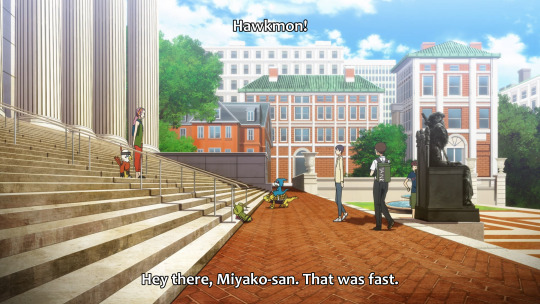
...but then picks it back up with zero hesitation the moment her friends present her that exact same job, and not only is it just “zero hesitation”, Ken even comments on how “fast” she arrived to do so! (This was also before Iori came up with the plan to infiltrate Menoa’s office; there wasn’t any indication Miyako’s computer abilities would be particularly necessary at the time.) On top of that, the drama CD gives us full context as to why she was so willing to dump this on her seniors in the first place -- she had wanted to see her friends so badly that she practically invented D-3 gate exploitation so she could hang out with her friends despite technically being in another country, and even wanted to invite them to come visit her, and eventually they’d all made an organized plan to meet up in New York. In other words, her loyalty to her friends is still stronger than anything else -- remember, she’s the kind of person who was picking up tons of jobs specifically so she could help her friends in the first place.
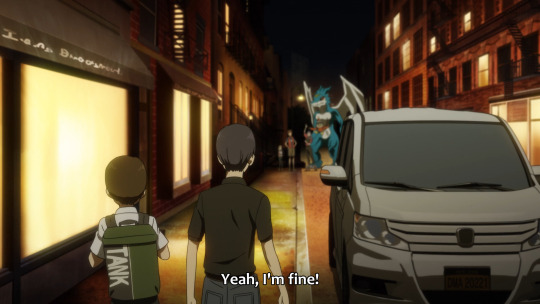
On that note, Ken’s ability to be casual with everyone besides Daisuke has noticeably improved, and that’s especially prominent with Miyako, whom he proactively converses with in a way that wouldn’t have happened back in 02, and, likewise, in contrast to the sense of distance she’d still been maintaining with him back during the final arc of 02 and Spring 2003, she has no qualms about handling him as casually as she would anyone else.
Which eventually leads us to...
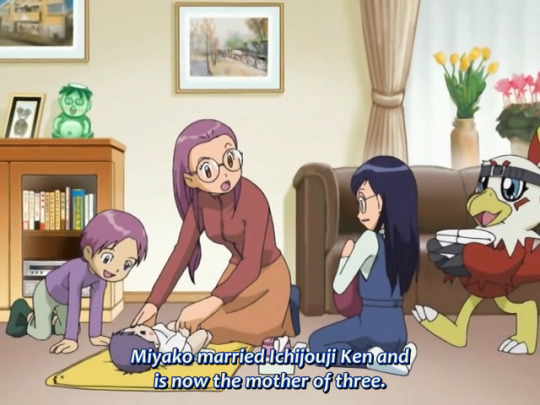
This is a recurring theme on this blog, but every so often I have to draw the distinction between creative concepts “in meta” (i.e. the way the audience will read it, in relation to franchise standards and other real-life factors) and said concepts “in-universe” (i.e. with audience factors completely removed, whether there’s a presumable logical reason for these events happening in-universe, and whether this is reasonable behavior to expect out of the characters). This blog is largely dedicated to the latter, but the reason why I have to keep drawing this distinction in the first place is that I get the impression that the staff behind Adventure and 02 really did not pay much mind to the former part as part of their dedication to the latter. And, I mean, part of the reason I respect the writing of Adventure and 02 so much is how uncompromising they were in terms of not really pandering to what a fanbase might expect, which allowed the story to retain a lot of creative integrity that it wouldn’t have otherwise.
But every so often you get something like this that makes me want to just bang my head on the table and scream, I swear, I get what you guys were going for, but I am begging you, please think a little harder about how people are going to read this!! In general, I do think there’s something that’s not very good about disregarding your audience completely, because if you’re trying to say important things and those things are going directly over your audience’s heads (this is a kids’ show, for goodness’s sake), you can’t call that good communication, and it’s not like you can blame the audience for getting blindsided or being upset, and this is before we get into what they just dropped on the global audience that was presumably full of young girls interested in STEM fields who were hoping to see them go all the way with that, or the feelings of those who are bothered that one character has to be singled out to be defined solely by her relationship to others, and I mean -- to be fair, with a character like Miyako and the tons of things going on with her, there was probably no outcome they could come up with that wouldn’t be reinforcing some negative stereotype (believe it or not, there are people who have conversely mentioned identifying deeply with Miyako’s personal story and the meaning of this ending to them, and have also expressed discomfort about some of the comments the fanbase has made over the years), but at the same time, holy hell, they really went for the one that immediately looks the worst on its face...
...That aside, I will reiterate that this is a blog and analysis meant for that latter category of “analyzing things in-universe”, and making good-faith assumptions that there was a reason for everything (and, I’ll be quite honest, reading everything the staff has said about the characters, including Miyako, there is no indication that they didn’t treat every single one of them with love and zero intention to curse any of them into a horrible fate). We can debate whether this was a good or bad choice in the context of real life, or how much they really should have thought this through more or considered alternative ways to do this, in another place and time (it’s been done by many other people, myself included, in the last 20 years, and it will most certainly continue after this, and probably should continue). It’s not like I’m necessarily giving my blessing to every single creative decision in Adventure or 02 in running this blog, it’s more of the attitude of “now that this decision was in the series, can we figure out what that was intended to mean?”, and that’s going to apply to this one too. And so, we’ll proceed with the analysis.
In any case, here’s the first thing to start with, which may surprise some people to learn: at no point in the epilogue is the word “housewife” ever used to refer to Miyako. The only words that Takeru uses to describe her are: that she is married to Ken and is a mother of three. Not only that, post-02 materials that have referred to the epilogue and Miyako’s part in it have also avoided using that word -- the Character Complete File and the Animation Chronicle only reiterate the same points of “married to Ken” and “mother of three children”, and practically go out of their way to avoid insinuating that being a stay-at-home housewife is the main focus of her life right now. It would have been so easy to say it outright if they’d wanted to, but they didn’t, and they consistently don’t, to the point the omission is almost suspicious. And, indeed, if you want to believe the Character Complete File, Miyako is not a full-time housewife and is simply not working at the time of the epilogue due to maternity leave because the third child had recently been born. So it’s completely within the realm of possibility that she’s still working! In that case, why is something that could easily be a big deal left ambiguous like this?
If you look at the way the epilogue presents its information, there’s a certain pattern: what information is emphasized and what information is given little attention or omitted has very little to do with “how curious the audience would be about it”, but rather “how relevant it is”; just because a certain piece of information is omitted doesn’t mean it necessarily isn’t true. For example, Sora; she’s married to Yamato, but despite how much the audience would probably consider that as vital information, it’s left for you to infer from the visuals and an oblique comment that Sora’s daughter is a “dependable older sister”, and even the question of whether Sora did succeed her mother in flower arrangement is left up in the air despite that also probably being a question the audience is curious about (and in fact, a few flower branches are clearly visible in the front, implying very heavily that, whatever happened, she’s at least still maintaining her roots with her family instead of violently cutting it all off). But we do learn about the fact that she went into fashion design, which is something that’s not an expectation that was placed by her family but rather something she presumably decided on herself. Hence, presumably why that’s the part emphasized, and moreso than her marriage to Yamato -- said marriage is of course an important part of her life, but it’s not as prominent as the fact that she has her own independent career, especially since her entire character arc was about doing things that she wanted for herself instead of doing things for others. That is to say, compared to their own individual ambitions, Sora and Yamato’s love life is “an important part, but not the important part.” This is especially when you add the context that Takeru is delivering abridged single-sentence “catch-up” descriptions of his friends on their behalf (possibly to the world, if this is part of his novel), and so, it begs the question: what would each of these characters want to be most remembered for accomplishing?
(And if you think I’m being tinfoil hat about this, remember that a constant theme with this blog I’m running is that “being annoyingly subtle and relying on ridiculously oblique messaging” like this permeates the entirety of 02 in general, and it’s definitely not the only time they’ve used this kind of technique to communicate details that are too consistent and on-the-nose to be passed off as coincidence. As far as assuming that this series follows rational storytelling logic goes, we are far past that point, and in ways that extend far beyond this epilogue.)
So we look back at Miyako, and the hobbies she’d indulged in and what purpose they were for, and her personality, and the fact that the main point of her character arc was about her complex that she would never be a good enough person who could properly emotionally reach out and take care of others -- in some ways, her arc was the opposite of Sora’s, in that while Sora’s was about not being as beholden to others, Miyako’s was about how to become someone who can better support others -- and once we apply the above question, there lies the answer to why the priority and emphasis given to her future in the epilogue is “Miyako is the kind of person who prioritizes taking care of and supporting her loved ones more than anything else.”

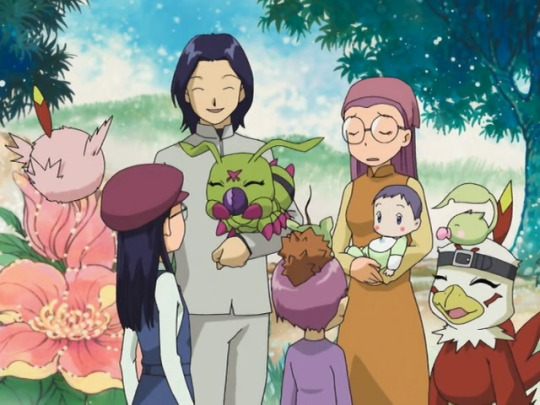
This is especially because (in an epilogue with not very many lines, so every bit of information becomes vital) the lines we see Miyako and her family exchange are representative of a lot of what that character arc was about. According to her son, Miyako is still her panicky and emotionally messy self, even when in the role of the matriarch of a large family who’s responsible for taking care of all of them. She did not ever become the ideal “gentle” and “mature” kind of person that she considered Mimi and Hikari to be and negatively compared herself to. However, her family responds by cheerfully laughing, which is -- most likely not coincidentally -- the same thing that was shown to be the positive flip side of Miyako’s over-the-top personality back in 02 episodes 31, 36, and 38, in that it brings joy and cheer to others.
If you do want to take the Character Complete File’s statement at face value, the fact that she’s on self-imposed maternity leave means that it’s very likely she wasn’t on a salaried job and was instead freelancing, or at least was involved with something that didn’t require constant commitment. Considering the fact she’s consistently portrayed as an impatient sort who gets bored easily, she probably would prefer something more flexible like freelancing or at least not being tied to a single thing; even looking back at her completely disparate hobbies back when she was a kid, when she was basically jack-of-all-trades-ing to fit whatever people needed her for, she never really came off as someone who could commit very easily to a single form of work, but what she did have commitment to was other people, especially her friends and family. If you (or, perhaps, Takeru) were to ask her during the time of the epilogue “what are you up to right now?”, it’s not really that hard to believe that gushing about her lovely family would come before everything else; not to say that everyone else here (especially her own husband) isn’t presumably devoted to their own families, but Miyako’s the type to have that much higher sense of pride in what she does for those she cares about than she would have particular attachment to any kind of work. Look at her behavior during Kizuna; she’s pursuing a degree in computer programming and thus is still aiming to be a busybody with a high level of skill, but when given a job by a stranger, she immediately dumps it off on her seniors so she can be with her friends, then happily accepts that same job again when the same friends present it back to her.
So, in other words, the conclusion is: the biggest priority and most important thing to Miyako in regards to her future is that she finally became someone who could properly support others around her, even in spite of her personality that would suggest otherwise.
In addition, the fact that she has three children might initially come off as a little in-your-face or overkill, but remember that Miyako came from a family with four siblings, and 02 episode 49 had her say outright that she does treasure that – or, in other words, being part of a big family surrounded by affection and love is something she considers to be a valuable part of her life (especially since the age gaps between the three children imply a reasonable likelihood of actual family planning, moreso than even Miyako’s own).
Incidentally, this is just a bit of a personal note, but one might notice that I’ve also never actually used the word “housewife” to refer to the epilogue’s depiction of Miyako in the course of writing for this blog, because of how little evidence we have that she is one – being on temporary maternity leave still being a very viable and, given the post-02 materials we now have, arguably heavily likely interpretation, it’s not like you’d necessarily call someone a housewife if their break from work is only temporary, even if they’re a freelancer. Given the above circumstances, perhaps something like “family matriarch” would be more accurate…
#digimon#digimon adventure 02#digimon adventure last evolution kizuna#inoue miyako#miyako inoue#kizuna spoilers#shihameta
101 notes
·
View notes
Text
Adventure and 02′s production philosophy and its impact on the storywriting (or: “a series made with love is best understood with love”)
It’s hard to really judge a series too much by its production details, but Adventure and 02′s staff has been very open about discussing background and production to the point we’re able to involve it in discussions. In fact, to a certain degree, we’ve gotten rather reliant on said production notes to explain too many things that weren’t clearly depicted or stated in the series -- I’ve spent a fair share of time complaining about how frustratingly subtle this series is -- and you see a lot of strange conspiracy theories or myths about production that circulate in all sorts of different directions. Undeniably, it’s a series that spoke to a ton of people, but there are still so many things that have perplexed people over the last two decades, and when you ask someone “what’s good about this series?”, people struggle to say it in clear words, often only able to resort to a rather oversimplified explanation like “the character development is good” (but what is character development, anyway?). A lot of times, some small things that initially don’t seem to track have led to some pretty wild, far-reaching fanbase-endorsed theories, when in fact the actual reality of the situation is much more mundane.
I think, in general, the best way to “understand” Adventure and 02 is simply to have an open mind about everything in regards to it. This is something I can only say because we currently have more than enough evidence, given production testimony, that this is the kind of series that was made with that kind of philosophy -- I will not shy away from the fact that there are things in this world that are made maliciously, meant to “one-up” the audience or using half-baked explanations as a way to cover up the fact that it wasn’t well thought-through. But in the case of Adventure and 02 specifically, almost everything we have heard about it is to the contrary, and, in practice, I find one can get much more out of the series by adjusting one’s mindset to think about what they’re looking out for and not, because once you have, the beauty of the series opens itself up even in places you’re not looking for it.
Let’s talk a little about the production philosophy behind Adventure and 02 and how it shaped a series that left such an impact on so many kids, and what we can learn from it!
“Something important that we wanted to tell the kids who were watching”
The two most important figures to know when it comes to Adventure and 02 production are its producer, Seki Hiromi (who would eventually go on to produce Tamers and Frontier as well, along with being supervising consultant on Kizuna), and its director, Kakudou Hiroyuki. I would say that both of these figures are probably the most influential people in shaping the series as we know it, but in different ways -- Kakudou was the one most responsible for building the world of Adventure and 02 and setting up the standard for having all sorts of background worldbuilding details that weren’t shown in the series, whereas Seki was the one who pushed for them to include family backgrounds and things that ought to be relatable to the average kid, so that they could empathize with the problems shown on screen.
Both of them had different ways of going at it, which is all for the better because it allowed the story to be enriched from both sides, but the common thread between the two was that they wanted to use this opportunity to “show the kids important things”:
Kakudou is the kind of person I would say is very “media literate” -- he was very well-read in books and well-versed in cinema, not just Japanese but also internationally, and also very in-tune with the Internet by the standards of a director in 1999. (Part of the reason we know so much about Digimon production now is that he still keeps up with everything on social media and throws in a few comments here and there.) His comments on the final episode of Adventure include a list of all of the things he credited for inspiring him during this series, and he later stated that he had a goal of conveying all of those “interesting things” to the kids watching, so that they could also find it interesting. So in other words, Adventure and 02 were basically his love letter to everything in media that he’d come to appreciate.
Seki was the one who pushed for humans to be involved in the series so that the audience could empathize with them, and for all of the “real world worldbuilding” like the kids’ family backgrounds. She’s also functionally responsible for the base premise of 02 at all, having been thoroughly alarmed by the story of a young boy skipping grades into university (to the point this plotline resurfaced a whole 20 years later in Kizuna). It can be said that the heavy “human drama” elements and family background emphasis continuing into Tamers and Frontier are probably her doing, and in terms of Kizuna, she also was responsible for personally vetting the dialogue to keep the kids in character, and it was said that it came off like she loved the characters as if they were her own children.
The result is that, firstly, Adventure and 02 is a series that is very well-thought through. Ridiculously well thought-through, in both background lore and character backgrounds and mentality. So many surface-level criticisms of Adventure and 02 come with an accusation that the writers were “lazy” or “did a writing cop-out”, but we actually have more evidence that the Adventure and 02 staff thought out so many details in the background that they kept forgetting that they hadn’t actually told the audience about it yet. (No, seriously, there’s a thread of official staff repeatedly forgetting that they may not have actually outright mentioned one of the background details they’d planned out in advance.) Even despite all of the extra information we’ve gotten since in the drama CDs and Animation Chronicle and such, it seems there’s still way more information that was planned out that we still haven’t learned about, and it’s presumably why there are so many little things that are too consistent to be coincidental and yet were still never actually stated. It may have been awful at communicating those details well, but those details were most definitely there, and both series have a shocking amount of consistency in adhering to them.
The second is that not only did the producer and director want to convey those important things, they also encouraged the rest of the staff to do it too:
One of the concepts behind the prior series was for us to pack in as many interesting things that we’d seen, heard about, or read about as we could into it, so for 02, we thought, what else could we put in beyond even that?, and so we looked over what we needed to have, and put in all the things we could so that they wouldn’t be left out, and the story became a multi-layered one, overlapping and accelerating. It was to the point that, after we’d gone through 02‘s story, the scriptwriters told me that they’d worn everything they had out to the ground.
So in other words, Adventure and 02 were basically a sort of potluck where they encouraged everyone on staff to come up with interesting things that they wanted to show the kids, and throw it all in -- and it’s presumably why the second half of 02 is so “crowded” (more on this later), because you had everything from all of the writers on staff adding another thing into the potluck, until everyone could get it out of their system. Yoshimura Genki, one of 02′s head writers, said outright that she used the famous 02 episode 23 to convey her concerns about some very real and horrible things happening to kids at the time, and it’s easy to imagine that all of the other writers and staff members were given similar encouragement to do so. Even the (in)famous 02 episode 13 was something originally created from Kakudou seeing Dagomon, thinking he was really cool and wanting to make an episode about him, and remembering that Konaka was good at Lovecraft and basically going “he’s gonna love this, we should get him to do an episode.” In fact, it’s said many times that a huge attitude behind production was to “not be ashamed of anything” and try whatever they wanted.
Which means that the result is a series that isn’t actually all that well-organized in plot or structure -- 02′s plot writing is of course an infamous pile of knots, but even those who are willing to be a bit more critical of Adventure often point out that its plot is simply more linear, being basically a video game-esque boss rush of “evil enemy, followed by even more evil enemy”. Most people do not watch Adventure or 02 for the actual plot writing. What they do watch it for is all of this stuff mentioned above -- that all of these different people on staff were given the question “what do you want to say to this audience of kids?” and took the opportunity to say something fun or meaningful. And, hence, why it’s best to understand Adventure and 02 not necessarily by the minutiae of its plot, but rather, “what was this series trying to say?”
Writing the series as it went along, under massive constraints
In general, Japanese anime is produced as it goes along -- even the character writing is subject to change depending on the voice actors’ performance (this was cited for Adventure specifically, but it’s well-known common practice for non-adaptation anime in general). That said, Adventure didn’t even have a guarantee of how long it was going to be at first -- it was generally expected that it’d be a one-year series (like most Toei series), but they weren’t even sure about it. This resulted in a very “loose mindset”, in which they decided to basically wing it, and the only thing determined for sure was that the epilogue (that we now know as the 02 epilogue) was going to be at the end of it.
As I mentioned above, scrutinizing the plot of Adventure too closely reveals that it’s not actually that coherent of a narrative, just more linear -- and, even by official admission, Hikari wasn’t planned to be the eighth child at first nor was the Tokyo arc of episodes planned to be that long, and yet this entire section is one of the most famous parts of Adventure. A lot of the best parts of Adventure and 02 seem to be the result of sheer accident...
...Or was it accident? Can you say that “going in with a positive mindset and a desire to do something meaningful” is accident? Even if you didn’t plan things out from the beginning, if you go into everything with an attitude of wanting to make the best out of something and make the best out of opportunities you see and hear about, is that really an accident? Couldn’t you perhaps say that this kind of thing is why Adventure and 02 hit so well with people to begin with?
By the time we get to 02, 02 started off as a very different series from the get-go, and it’s always struck me as very odd that people act like 02 was tacked on and didn’t have nearly the exact same staff. It was Kakudou himself who petitioned for 02 to start off with a light atmosphere, and the series itself was fundamentally meant to be addressing the new concepts of “relationships” instead of Adventure’s “self-assertion”, and explore concepts that hadn’t been covered in Adventure. The reason 02 is so different from Adventure is exactly because the staff didn’t want to rehash things for another year, and instead wanted to take the opportunity to cover stuff Adventure didn’t. And the fact that 02 is lighter than Adventure at first, but quickly gets darker, is also by design:
The story had gotten rather heavy by the time of Digimon Adventure, so we decided to make it come off as brighter. And then, it actually ended up getting even heavier somewhere down the line, but there was no way we could just avoid depicting important life problems.
Which is also a similar sentiment reflected by Seki herself, when thinking about how her suggested plotline ended up making the story darker:
An overly intelligent child, prone to falling into loneliness, cut off from his friends and family, and with a Digimon slowly coming and staying close to him…I remember that kind of image forming. We were supposed to have been aiming to have them going to the Digital World with the mood of a picnic, but the fact it didn’t end up so easy for them may have been my fault…or so I remember thinking as I reflected on it.
02 didn’t get dark for the sheer sake of getting dark, and in fact it’s not like the staff necessarily wanted it to get that way, but there were so many meaningful things that they wanted to tell the audience of kids that they allowed it to. It’s also kind of odd how the fanbase has this idea of there somehow being staff conflicts or people bickering in order to produce 02, but there’s no indication of this at all -- at most, 02 unusually had two head writers instead of one, Yoshimura Genki and Maekawa Atsushi, but it was even said that they had a clear division of roles, with Yoshimura on the “villains” side and Maekawa on the “protagonists” side, and there’s no sign of conflict.
(A lot of people also tend to give more credit to Yoshimura since the villains are some of the most masterfully crafted part of both Adventure or 02, but this is still somewhat reductive; Maekawa is very open about the fact that he was rather inexperienced during 02′s production, and considering the fact that the 02 protagonists aren’t nearly as underdeveloped as the fanbase claims they are, and Maekawa would later go on to write a PreCure entry that basically saved the franchise and a very well-acclaimed Super Sentai entry, both with many parallels to 02, his role should not be discounted, especially since 02 is often liked by its fanbase for the duality between both its lighter and darker sides.)
So we had the staff basically on a roll of throwing in everything important they wanted to say to the kids, both “fun” and “meaningful”, and then, two things impacted the way it ended: firstly, they weren’t allowed to go with their initial proposal for the final enemy because it was too gory, and secondly, the decision was made midway through that they would not be making a third Adventure series, and would have to end more quickly than expected.
I think, whenever you hear stories of “we were originally going to do this but couldn’t,” people generally tend to assume that they should have done the original plan (especially if the original plan was particularly gory or brutal, because everyone loves to think that edgy is better), but, perhaps fittingly for a series that’s about not drowning in past regrets of “what should have been” and learning to move on, the staff has never really shown any indications of really, thoroughly regretting any of the decisions they made for 02, even if the second half came out messy. If you look at that original proposal they had for 02′s final enemy, in which it would be an enemy “reduced to an idea”, it certainly explains a lot about why BelialVamdemon was defeated by the power of sheer positivity in the final ending -- obviously that would make a lot more sense with a conceptual embodiment of malice, instead of a returning enemy from the prior series -- but at the same time, that loss of that concept led to the creation of Oikawa, Archnemon, and Mummymon, which have consistently been praised as one of the most compelling parts of 02 and its finale, and Yoshimura herself even gushed about the concepts they got. So it’s not “we couldn’t do what we wanted,” it’s more “we couldn’t do what we initially wanted and made something out of it, arguably an even better something in certain ways.”
And as for the lack of the third Adventure series, all indications point to the fact that this was something by personal choice of the staff, not by higher-up mandate -- not that I enjoy speculating about other people I don’t know, but if you actually follow what Kakudou has said about his work on Adventure and 02, and the fact that he considers his later work on X-Evolution to functionally be getting everything else out of his system (even saying that he liked Bandai doing a lot of the work for him), Kakudou doesn’t seem to want to be the main leader of his projects for the most part, mostly seeing Adventure and 02 as the one time he got to dump all of his one-time ideas that he personally wanted to accomplish, and otherwise being satisfied doing episode direction work for others -- testimony as to the handoff between 02 and Tamers consistently depicts him as expressing sentiments similar to “please let me have a break.” (As of this writing, he still does work for Toei, but has never been lead director on a full series since.) Kakudou didn’t like having to deal with a bunch of increasingly canon-contradictory works because, as an infamously detail-oriented and consistent person, dealing with that kind of thing didn’t really seem to agree with him, and moreover it’s understandable that he (and the other staff) would feel that it was better to end it there instead of overstaying its welcome and stretching things out.
Certainly, when you look at the second half of 02, its plot is “crowded” in nearly every direction (not as incomprehensible as people like to claim it is, but definitely going in a lot of places at once). The infamous 02 epilogue is probably the biggest example of the disparity between staff thought and how it came off; remember that it was one of the first things decided about the series at all, meaning that the staff was deliberating over it and under the impression they were building up to it for a whole two years, but when it finally dropped everyone was blindsided and even often made accusations of the staff coming up with it at the last minute while drunk or something (not helped by the staff clearly being so fixated on their own production that they even included details that were completely incomprehensible to anyone not aware of the potential third series plotline). Yet, ever since then, many people who have sat down with it have figured out that it’s not that incomprehensible and that many of the aspects of it make sense on a theoretical level or are foreshadowed in the series -- it’s just that they tacked it onto the end of an excessively crowded finale with no warning and didn’t sufficiently communicate their reasoning for it, requiring people to spend the next 20 years puzzling it out and Kizuna to come around to drop even more clues, and also failed to realize that one of humanity’s most die-on-a-hill issues about media (shipping) would make people a lot more offended than they likely intended. (PreCure has successfully pulled off “adult timeskip” epilogues in recent years, and they’ve all been received well, but the difference is that they actually pad out the episode with a proper lead-up instead of just chucking it in your face right after Oikawa dies.)
And, ultimately, the staff has never shown any signs of having regret over this. Kakudou takes the stance that they were able to close out 02 in a good way, despite all of the circumstances. The rest of the staff, including Seki herself, and overall Toei as a whole, has doubled down further on the latter half of 02′s plot events and the epilogue’s place in canon despite the infamous controversy around it, and I have to say that I do at least understand why they’re like this when you consider the circumstances and their likely feelings on it -- regardless of everything, they’re proud of the work they did on it, and even if not everything went according to original plan, they loved taking the opportunity to use the sandbox to express things they may not have been able to in their other projects, and the epilogue was their baby that they’d been raising for two years. It’s the ultimate question of “satisfying the creators vs. satisfying the audience” -- not to say that I completely agree with the call to be this unaware of how people were going to read this, because it’s not good to blindside your audience or hurt their feelings, but at the same time, it’s said that you will never be able to satisfy an audience at all if you’re not satisfying yourself first. And in the end, despite everything, that something in Adventure and 02, built out of that earnest desire to say something, came across in some ways and touched the hearts of kids all over the world.
So the result was that the Adventure and 02 staff did everything they wanted, got it out of their system, and handed an imperfect but carefully-crafted baton to Seki, who decided that it was a good opportunity to do something completely new, and deliberately picked Tamers’s director Kaizawa on the grounds that he’d had no experience with the series before. Remembering that Seki was on Adventure and 02 and was clearly happy with it, her decision to do something new with Tamers was just that -- to do something new -- and it’s honestly kind of saddening that the series’ respective fanbases treat each other with significantly less respect than their actual creators do, since both series still shared a lot of staff, Kakudou went on to be an episode director for Tamers (and even calls it a “masterpiece”), and Konaka clearly has a lot of respect for his predecessor series as well, with Tamers being its own product made with conscientiousness and a desire to make things meaningful for kids (Kaizawa himself has expressed a lot of strong opinions on this topic). A lot of anti-02 folks have often spread a conspiracy theory that Tamers came out of a “writer revolt” because they hated being “restricted” by 02 and wanted “more freedom” -- but that is completely contrary to the above evidence where 02′s production process arguably gave the writers too much freedom, and Tamers head staff was picked deliberately due to their lack of connection to the prior series so that they could do something conversely new and fresh...
One thing that’s interesting about Kizuna is that its director, Taguchi Tomohisa, has spoken very often about his love for the original series, right down to respecting its ability to cover very serious topics. His recruitment philosophy for the movie also seemed to have “being a fan of the series” as a big plus factor, and he moreover shows a lot of respect for the staff members involved in production, both the people he recruited and the long-timers like Seki. “Being a fan of the series” doesn’t necessarily constitute skill by itself, but there’s a lot of similar sentiments in “let’s make something that shows respect and does something interesting and important” and “let’s make sure the staff gets to do something without regrets” also seem to be pretty huge factors in consideration here, rather similar to the original series...
What this means in terms of understanding the series
I do not think that, just because a creator clearly had good reasoning for putting in what they did, the audience necessarily has to accept that. It may have had good intentions, but "intentions” don’t justify things coming off the way they do, or at least, the 20/20 hindsight can make us all get together and think “if that was your intention, there were probably a million better ways to execute that.” And, as someone writing this blog, there are times I really think “if you could have please just thought a little harder about making those ideas clearer so we wouldn’t have to have these arguments...”
However, I do think there is something illuminating about the idea of “adjusting one’s mindset” in response to the above revelations, and going in with an open mind when trying to get something out of the series for one’s own sake. I mean this truly in the sense of encouraging others to find something interesting and new -- this is not a blog I write expecting people to see things the same way I do, as much as I like encouraging people to look out for things they might have not noticed beforehand.
I started writing for this blog regularly last year (I hadn’t even planned to start regularly doing it) after a rewatch of Adventure and 02 with some friends and some honest discussion about the series after it, and one thing we all agreed to do when we did that rewatch was “we are not going to go in with the intent to criticize it.” That is to say, we decided to throw out all of those sentiments that you have to “admit” everything wrong with any series when even bringing up its name -- which is not to say that we’re glossing over potential criticisms or their validity, just “we’re doing this rewatch to have fun and to enjoy and appreciate things, and that will be our priority going in.” After making that agreement, something really magical happened, and it was that we started catching things without even looking for it, things that had clearly been planned but hidden in the background, or things that were caught by one person in the group watch chat and pointed out to the others, and it turned out that a huge chunk of the “criticisms” we might have originally gone in with actually did have answers, we just hadn’t realized it because we were too brainwashed into the mindset of dismissing things as “well, that part’s just bad writing.”
Of course, we’ve seen bad writing -- it’s not like we were going out of our way to absolve everyone for every mistake -- but that base mindset allowed us to better appreciate things we might have missed earlier that weren’t immediately apparent. I’ve said many times that I don’t think the things I write on here are that huge speculation -- in fact, in writing meta, I often throw out a lot of stuff because I think “yeah that’s too absurd, let’s just stick with the simplest explanation” -- as much as I just thread things that are in the series but are frustratingly subtle, because I’m taking things that seem like throwaway details and going “hm, well, instead of just dropping it the first time like ‘probably bad writing’, let’s maybe look at this one more time and see if there was a reason?” And those reasons present themselves surprisingly easily without even that much effort, and after a while you come to realize: this is a really consistent series!
It’s actually very rare that things outright contradict themselves, because it really does not take long to piece together a rational explanation (because those things are in the series, just buried)! This was a detail-oriented series that had a ridiculous amount of attention paid to it, even if it didn’t communicate that! Whenever I post meta, I often get comments from people who say outright that they’d had the same impressions, they just didn’t know how to put it in words! There’s been multiple cases of people independently coming up with readings of the series that the fanbase historically dismissed as a reach, only for official to come out and confirm they were absolutely correct, and a common thread between all of these is that they were referenced in the series, it’s just that people kept wanting to dismiss them because “there’s no way they’d be that detailed”! A truly contradictory series falls apart when you subject it to higher scrutiny (even when you’re being optimistic about it), but there’s a strange thing about Adventure and 02 in that they actually fit together even more when you look closely -- and, again, things start coming in when you don’t even expect it, just because of your mindset.
I suppose the take-home here with all of this is that a series like this is best understood when you have an open mind and a desire to listen to what it has to say. As I said before: Adventure and 02 (and especially 02) are not series that most people watch for the plot, and, to be honest, it’s clear that plot wasn’t even a priority for all of the staff in the first place as much as it was about conveying important ideas and sentiments. And I’m not going to say whether not prioritizing plot or not is a “good” or “bad” thing -- for some people, that kind of thing is understandably very important, and a series like 02 can be very frustrating to deal with as a result! -- as much as, for those who have a genuine interest in sitting down and understanding these series, I cannot recommend scrutinizing the plot too much simply because it will not get you very far, and, to be honest, whenever I see a lot of analyses of Adventure and 02, I really do often wonder if they actually understand the core of the series and the sentiment and emotion behind it, or whether they’re just doing it on a technical surface level so they can say they did (which is usually partially as a bid to passive-aggressively dunk on later series to prove Adventure is superior). The entire concept of objectivity is a lie in itself, but this is not a series that you can get much out of if you try to evaluate it with that kind of detachment; it’s a series that spoke to you through theme and passion first and foremost, and to receive that message and “enjoy” the series is most effectively done when you detach all of those doubts and approach the series without malice.
(By the way, this is not me claiming I’m inherently a “better” analyst just because I also prefer to use this mentality when approaching it; it’s just that I’m a bit frustrated that this kind of approach is so hard to find, despite Adventure’s popularity, because losing out on the heart causes so much rich potential to get lost. This is also the reason I recommend @analyzingadventure‘s work so much -- I’m so sorry about tagging you for the third time here! -- because they’re as positive about Adventure as I am about 02, and their insight and thought into the series coming from the angle of “appreciating” it with genuine positivity is something I believe is truly valuable in a climate where this is very hard to find.)
And this is what I mean, “to approach it without malice”. I don’t mean that you should go in prepared to never have criticisms of it ever again, nor that you should just absolve everything and assume that everything is fine, but rather that going in with a mindset of “we’re going to look for things to love” instead of “we’re going to ‘look past’ the bad” alone has the magical effect of shifting your entire view of the series, way more than I would say with any other. And, again, that’s only something that can happen when the base product was made with this much sentiment and honesty to begin with, and moreover fighting against the mindset to criticize is tough when we’re dealing with a fanbase that’s acted like being “fair” requires “acknowledging” the faults of everything in the same breath you praise it until the horse is beaten for two decades and everyone’s exhausted. (And then yells at you if you dare criticize anything that’s put on the fanbase’s pedestal.) It’s kind of the question of: should this really be about media criticism and whether it’s “objectively” good or bad, especially since this has been brought up so often for two decades now, or might it be better to think about how to have a more positive experience with something that you may not have had before?
Once you get rid of that mindset of “critical by default”, you start to realize things that the series did knock out of the park, or were exceptional, that got too obscured by the distractions of fixating on its plot -- 02 is a plot mess for sure, but I have never seen any series that is so sincere and earnest about its actual themes and things it wanted to say, and it’s something I love it even more for. And buried under that criticism of everyone not getting “equal attention” from an evolutionary forms perspective is the fact that, from a story perspective, they deliberately went out of their way to make sure everyone gets mostly equal focus, which is something that sticks out especially when you start watching other long-running series that aren’t as good about this, and although it’s not completely perfect by any means, they do a damn good job keeping everyone in the 8- and 6-person groups relevant to the very end, which is pretty impressive! And, in the end, you end up having a much healthier relationship with the series -- again, it’s not glossing over everything to pretend nothing is wrong per se, but rather, you’re able to appreciate it and love it for what it is, instead of constantly feeling like you’re making up for its “mistakes”.
66 notes
·
View notes